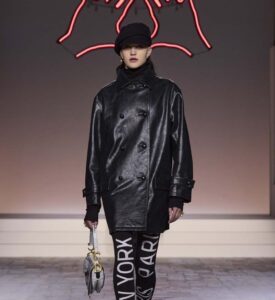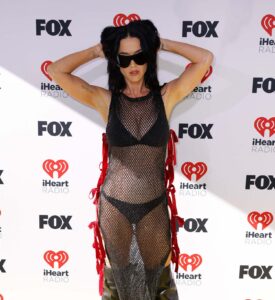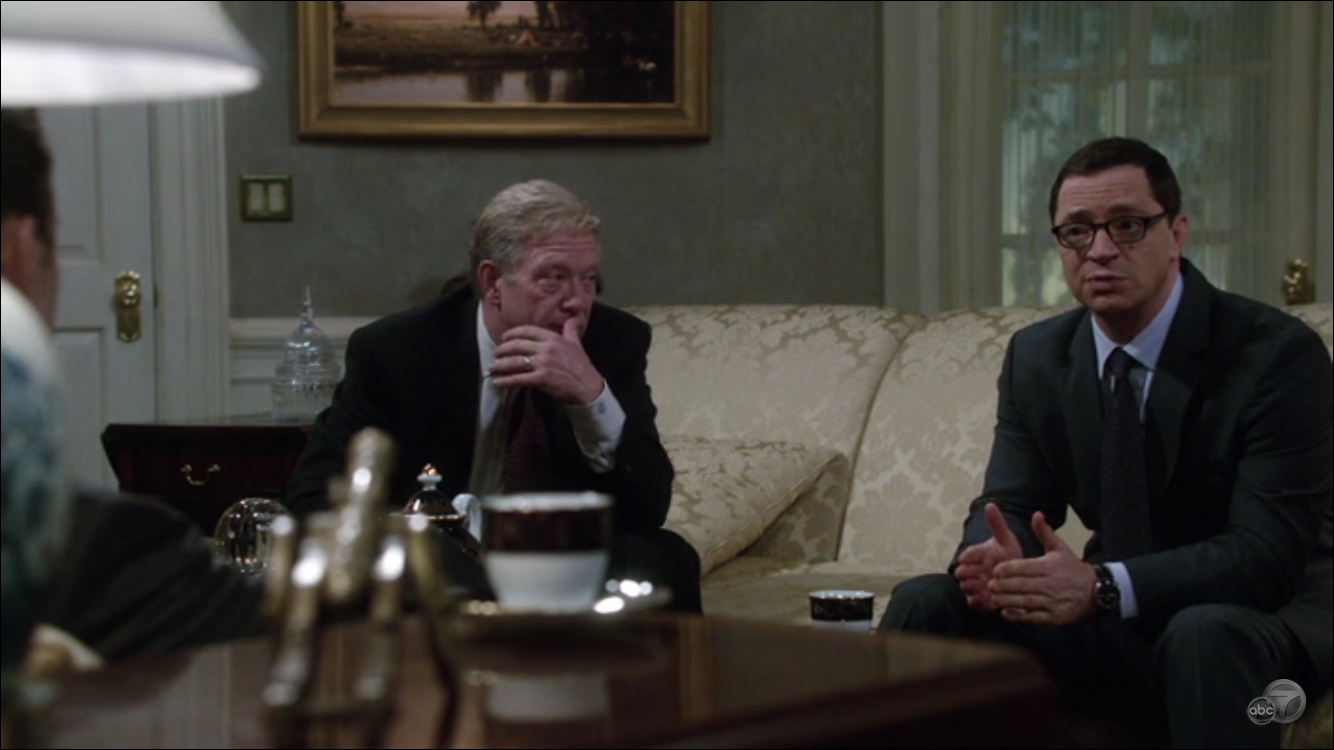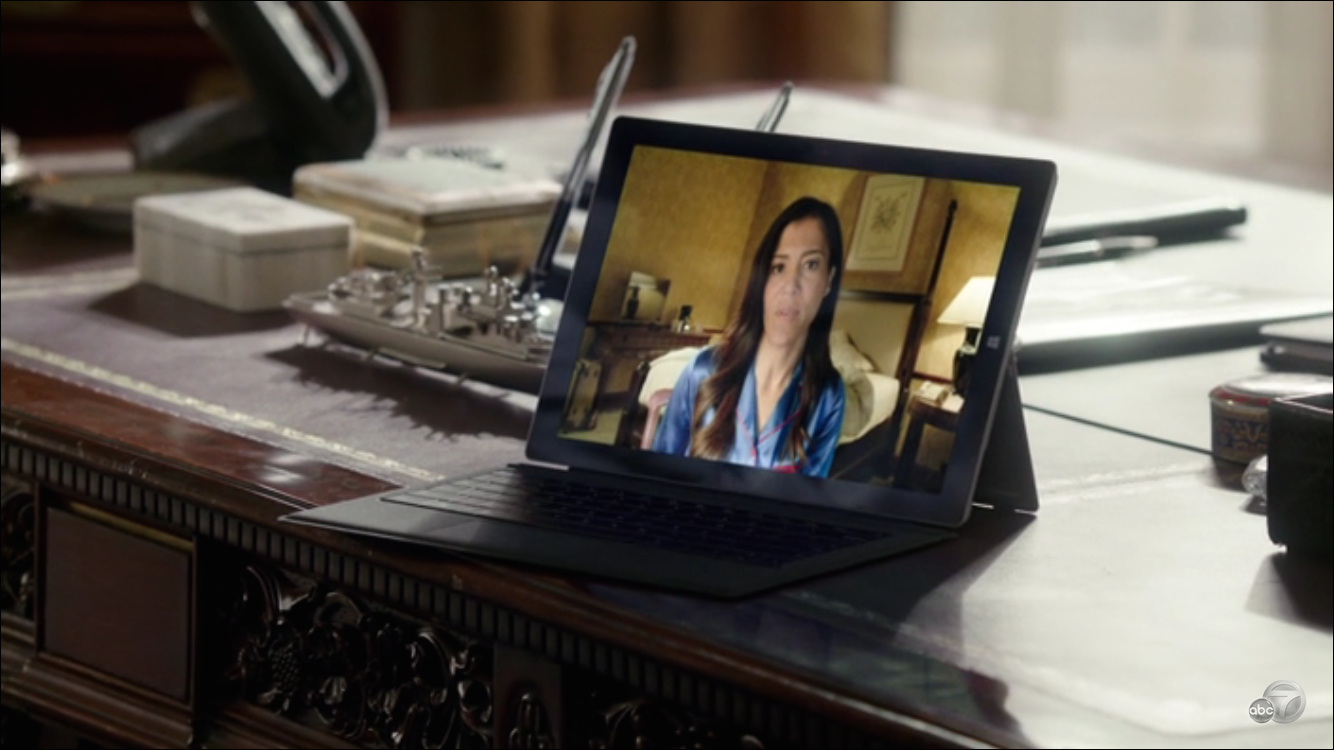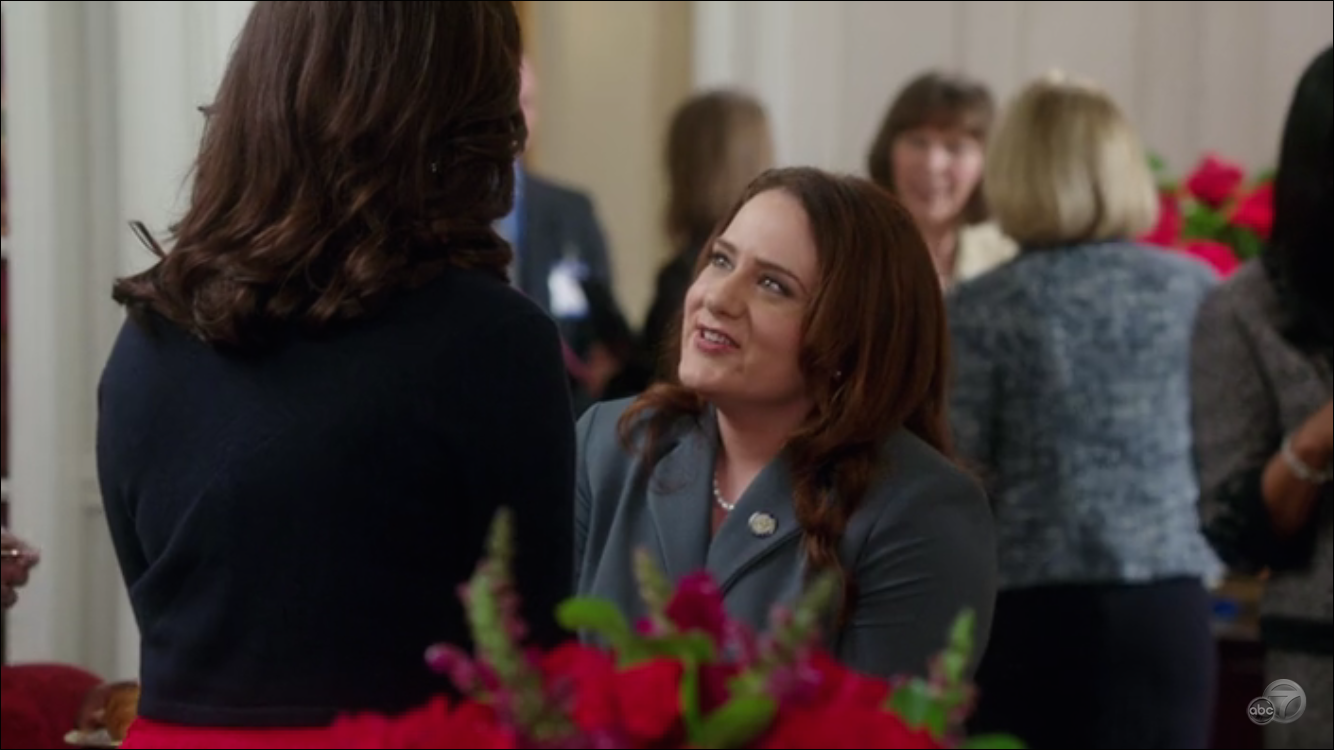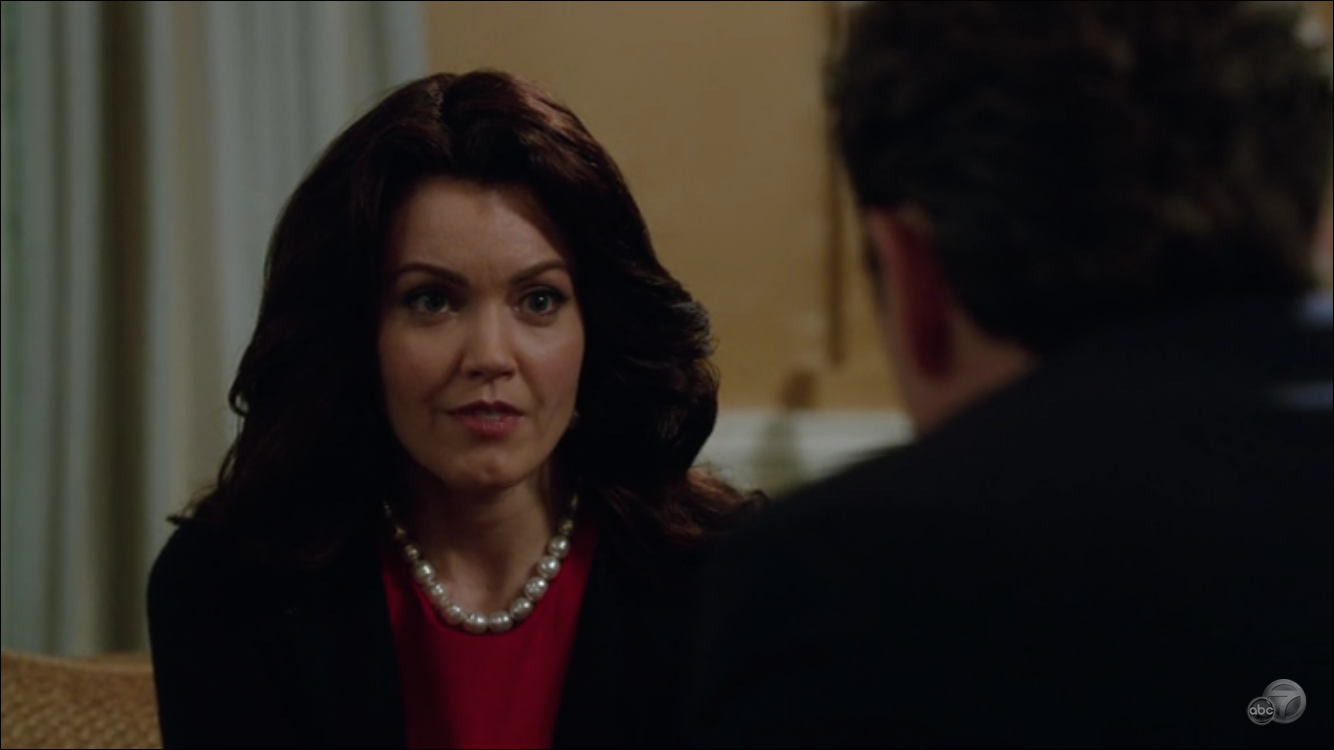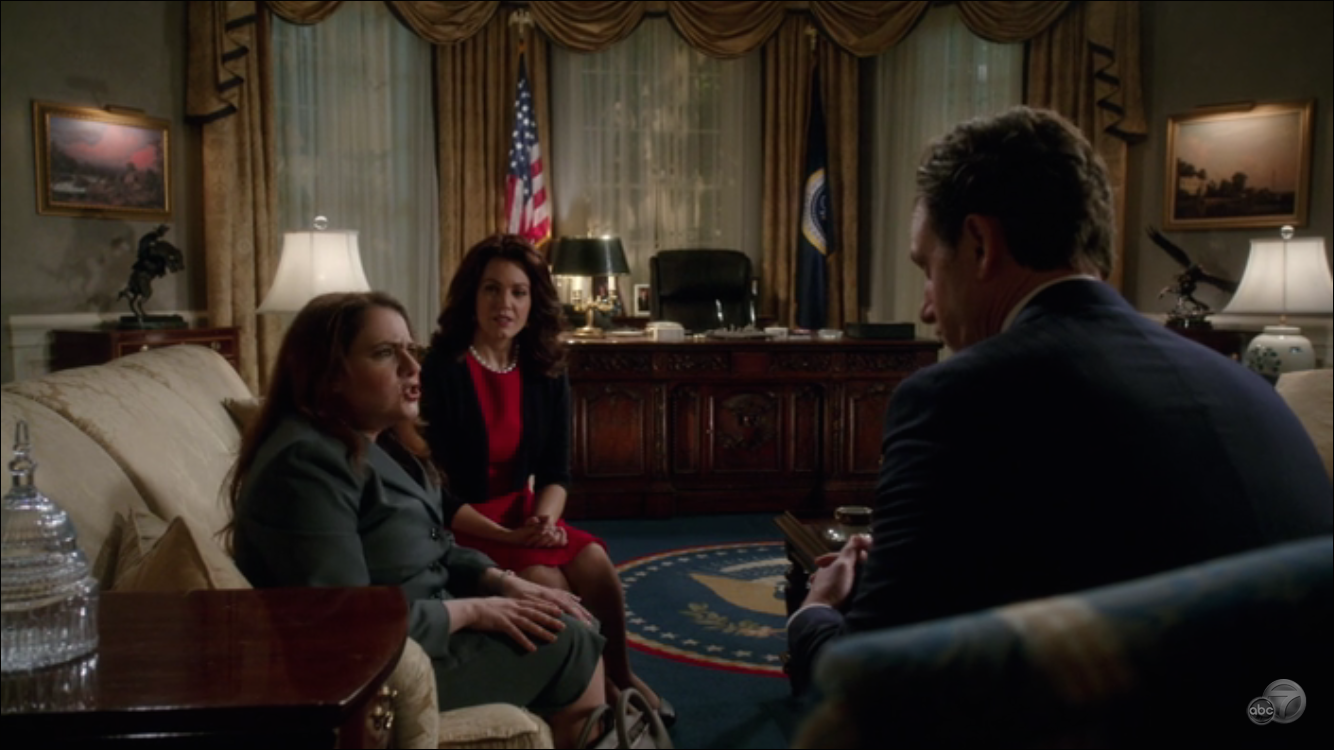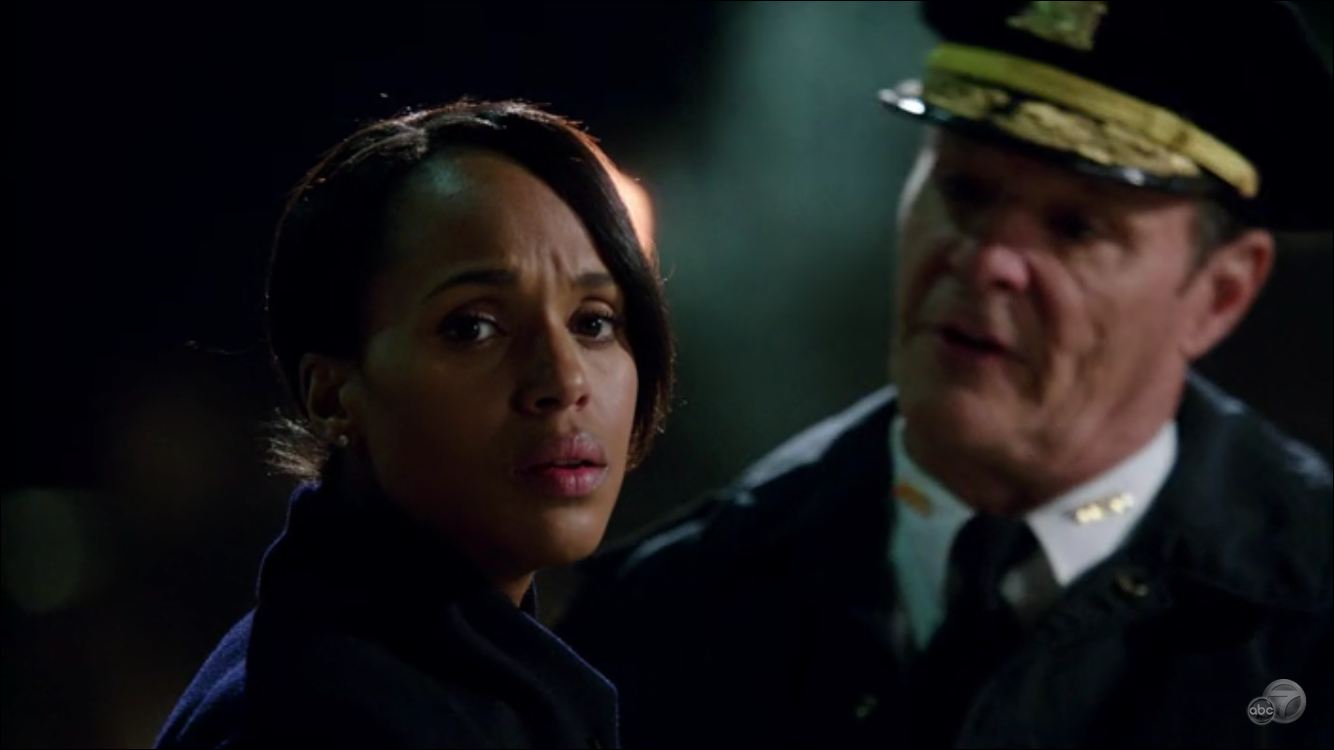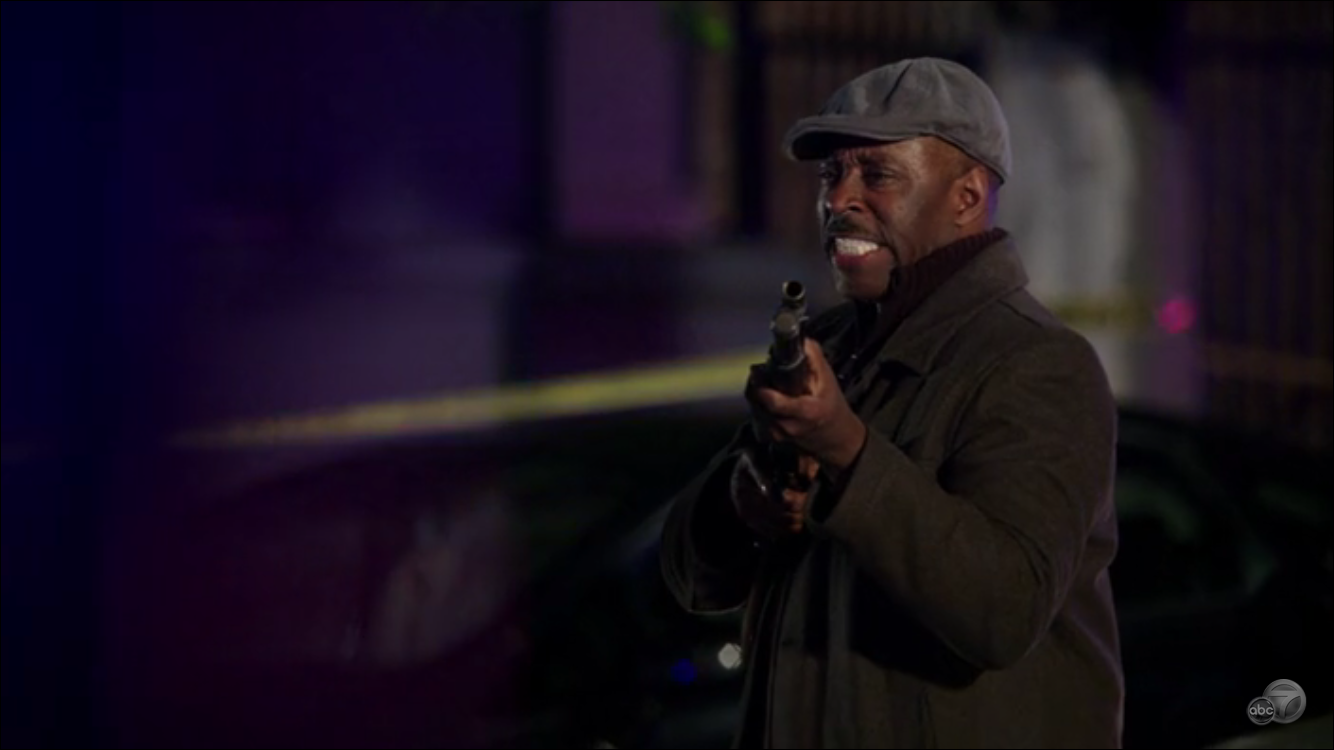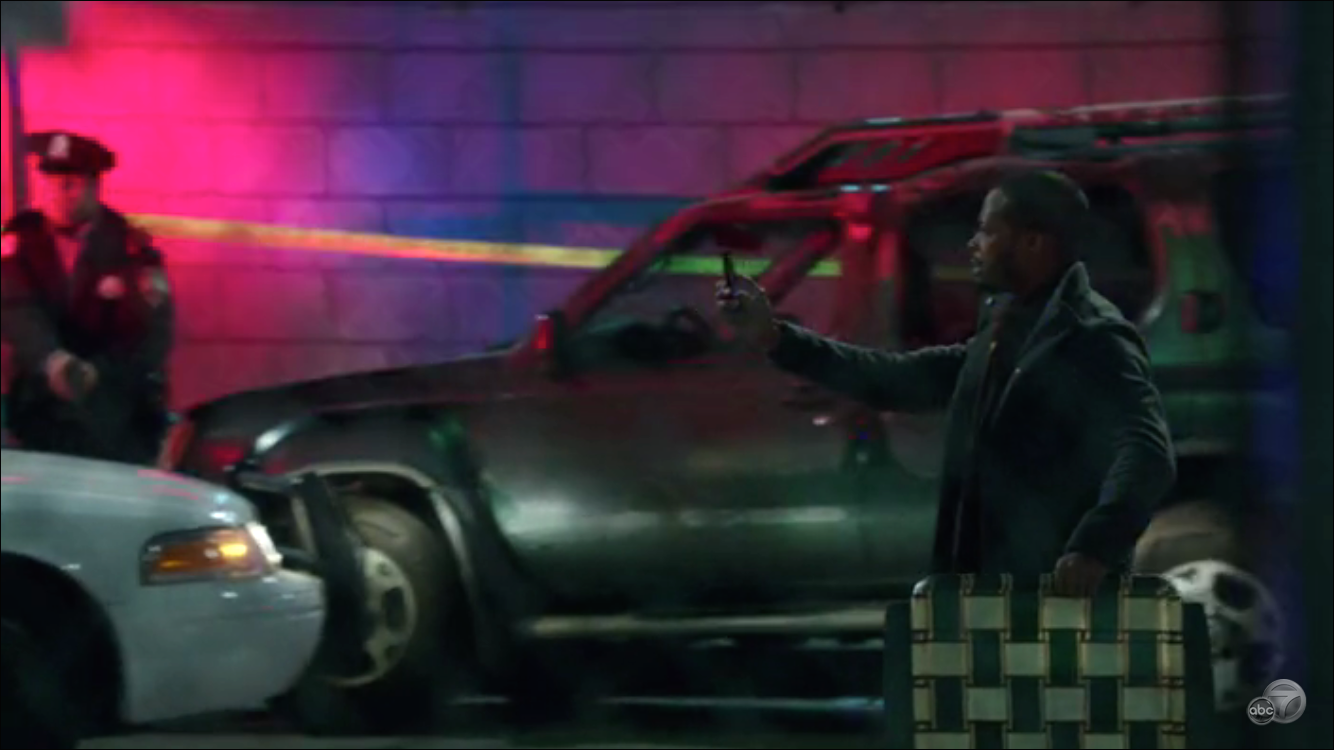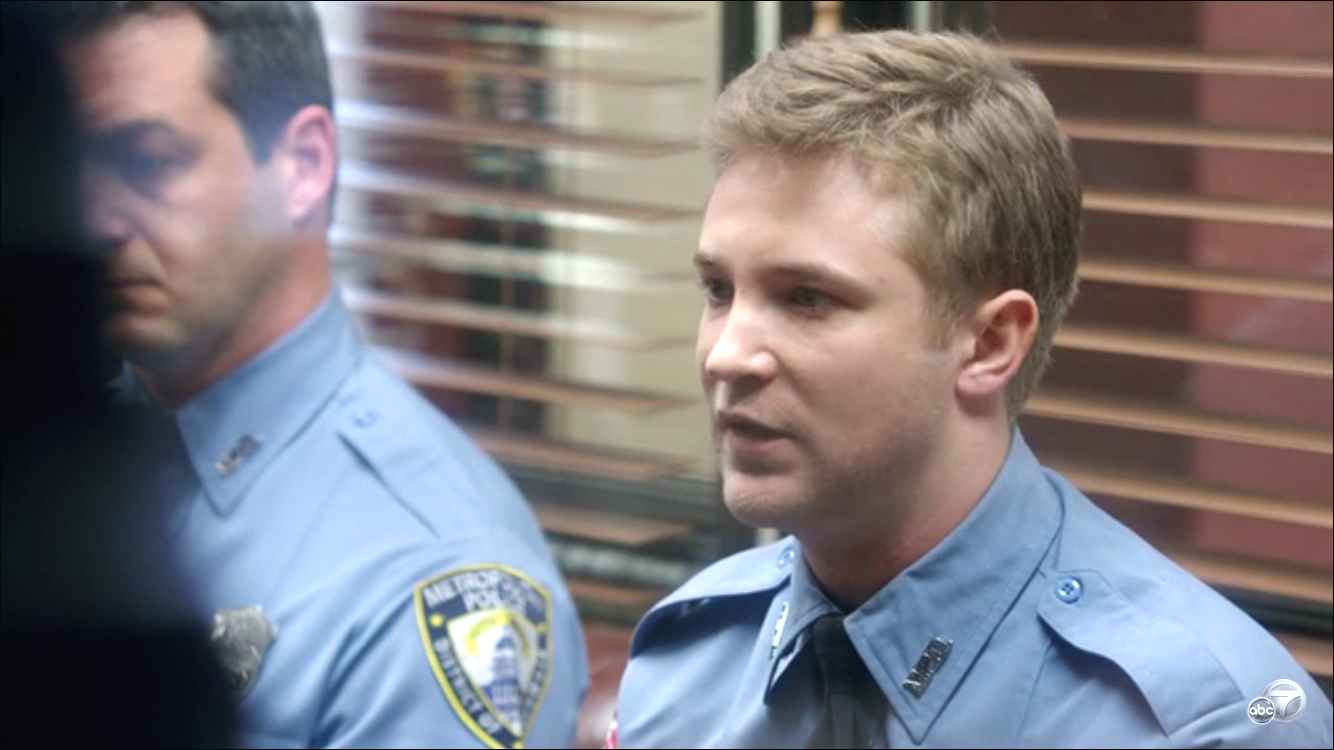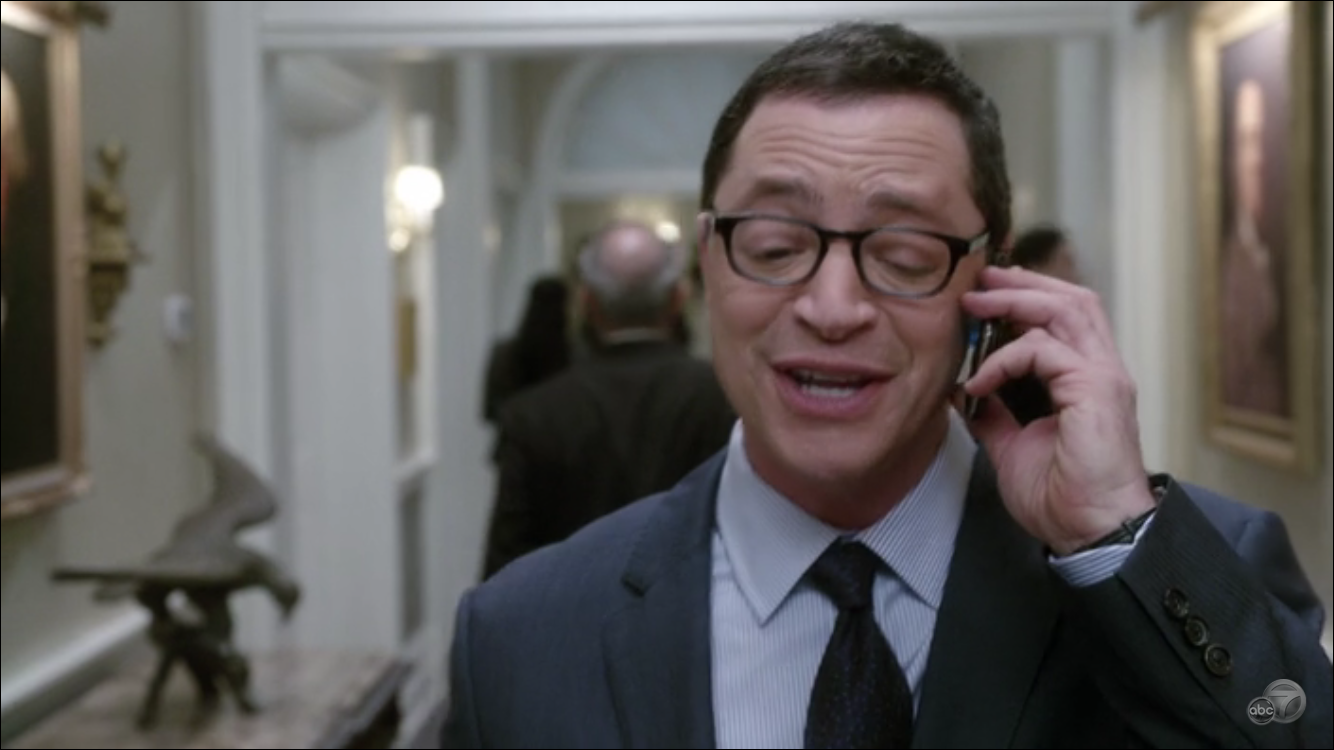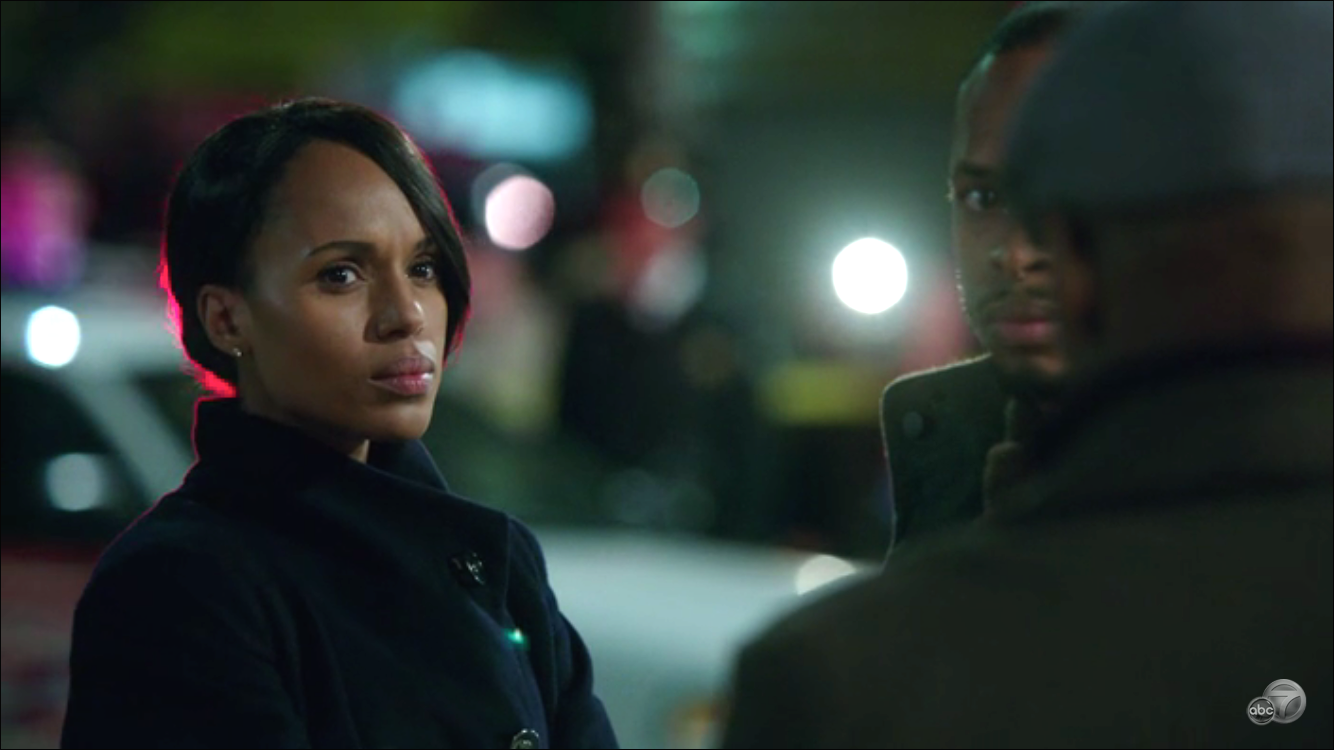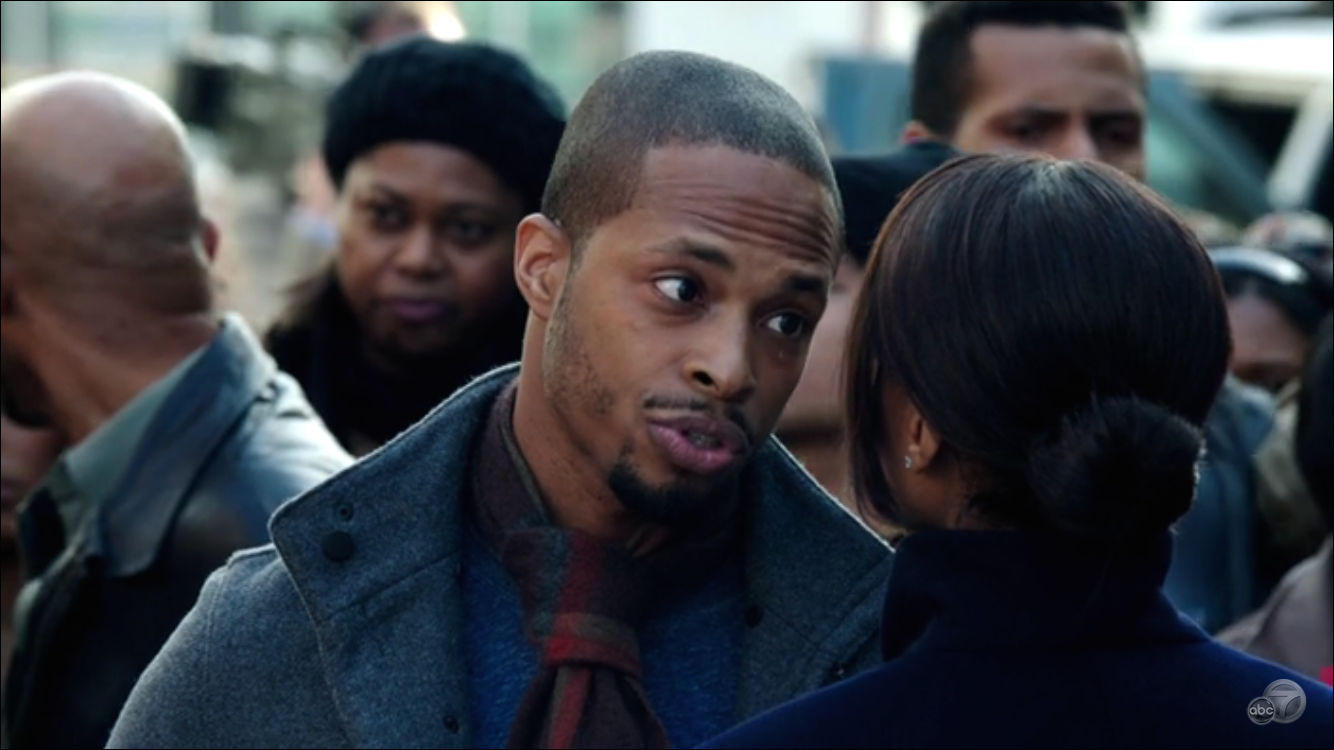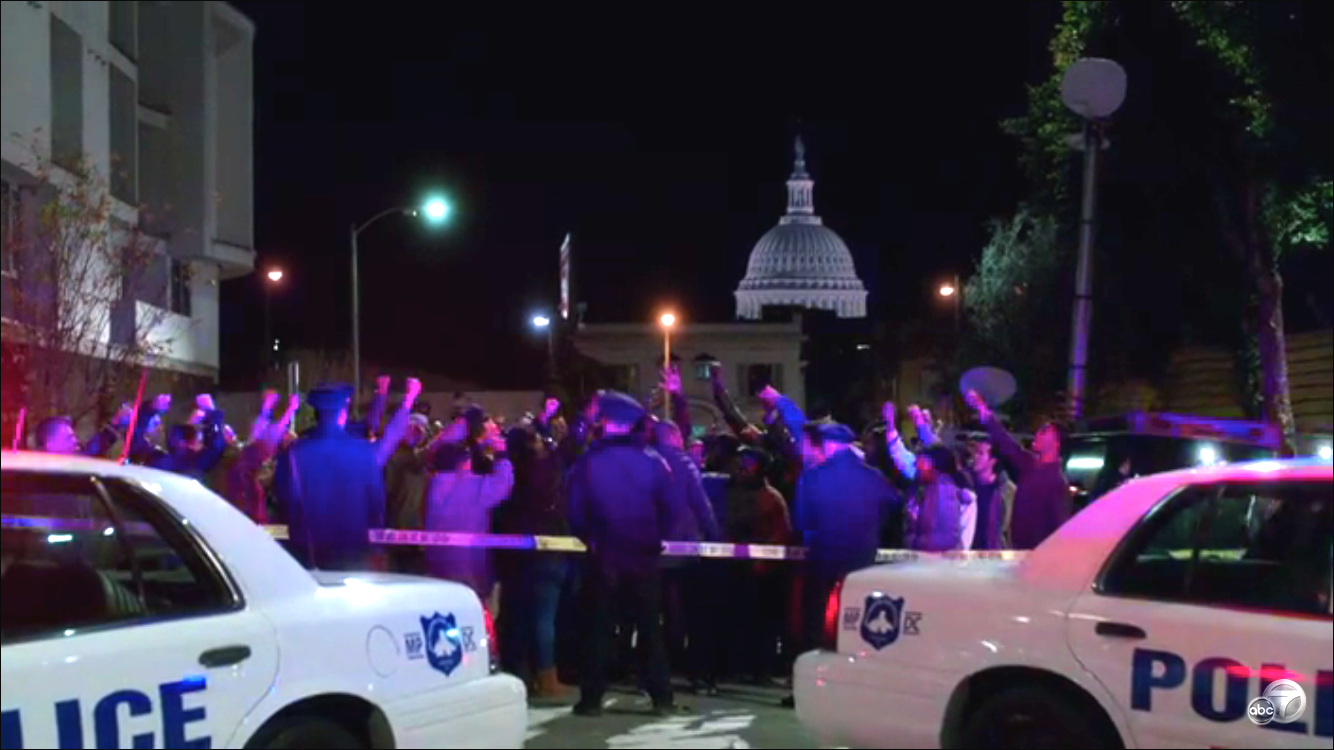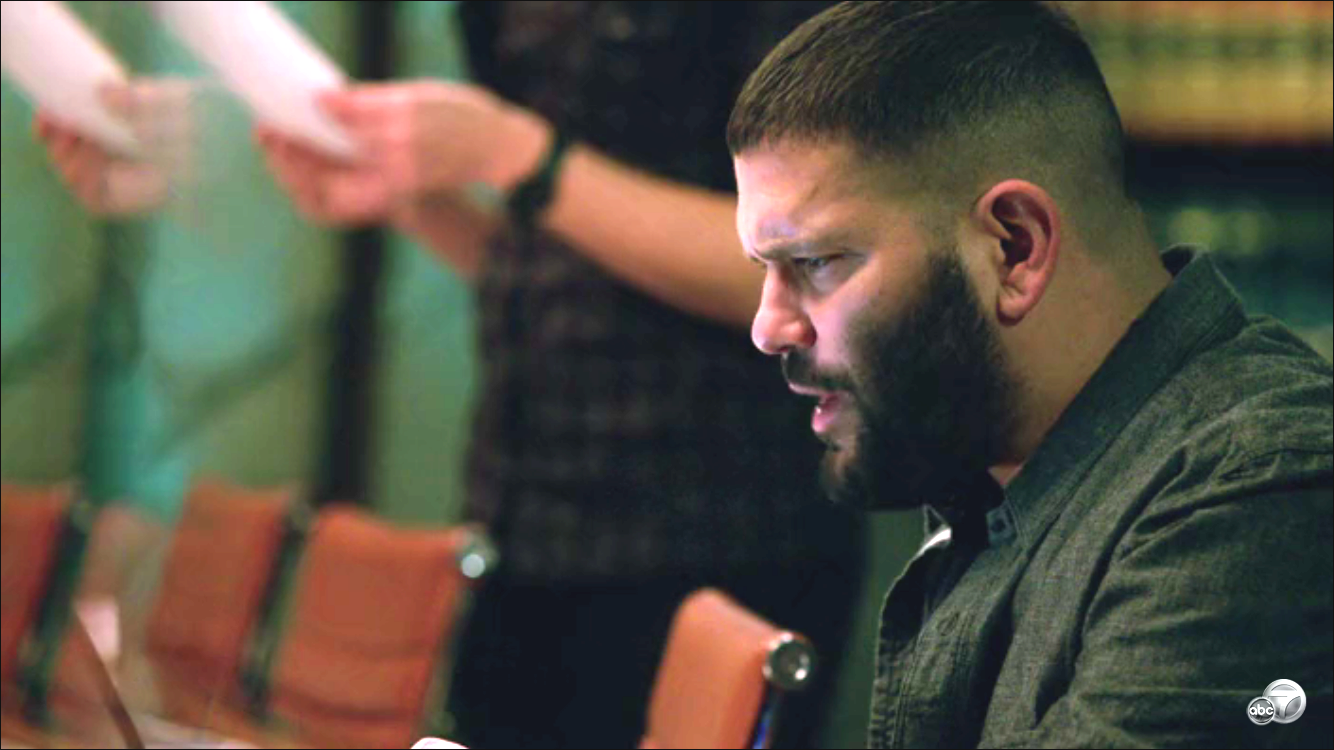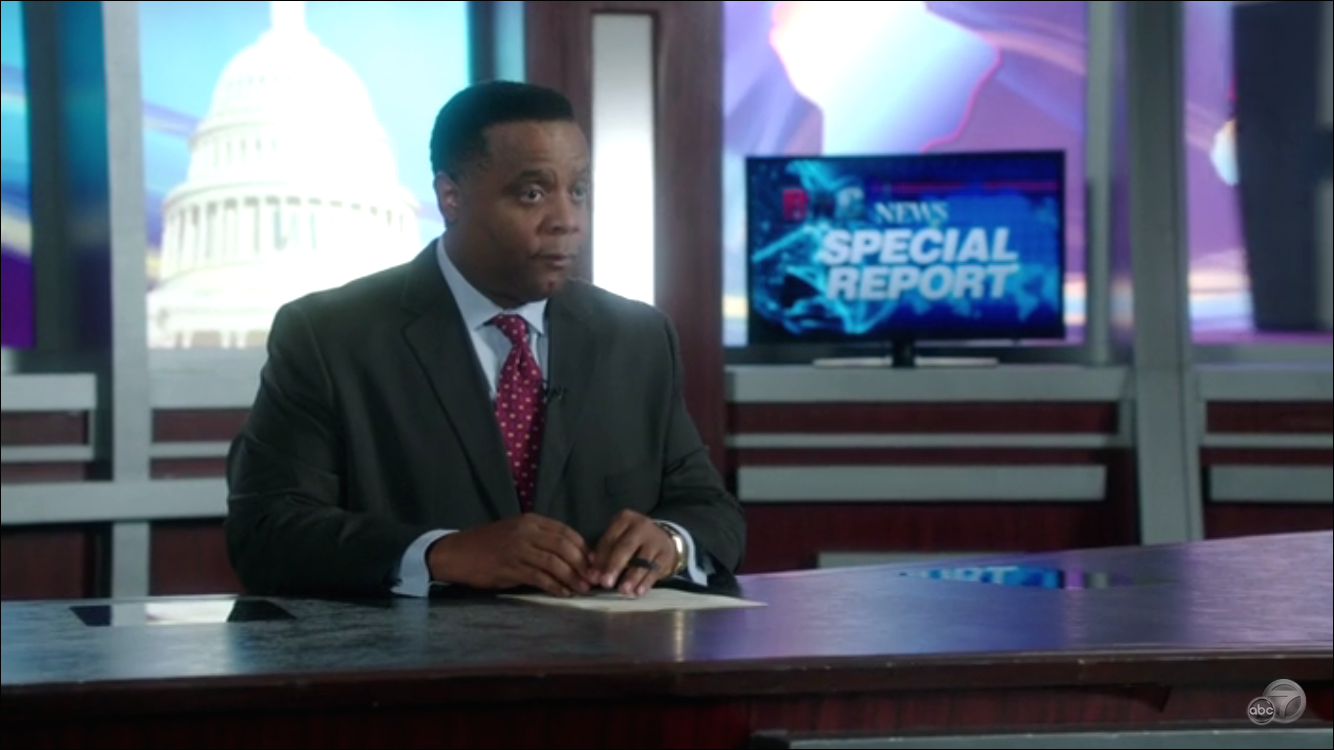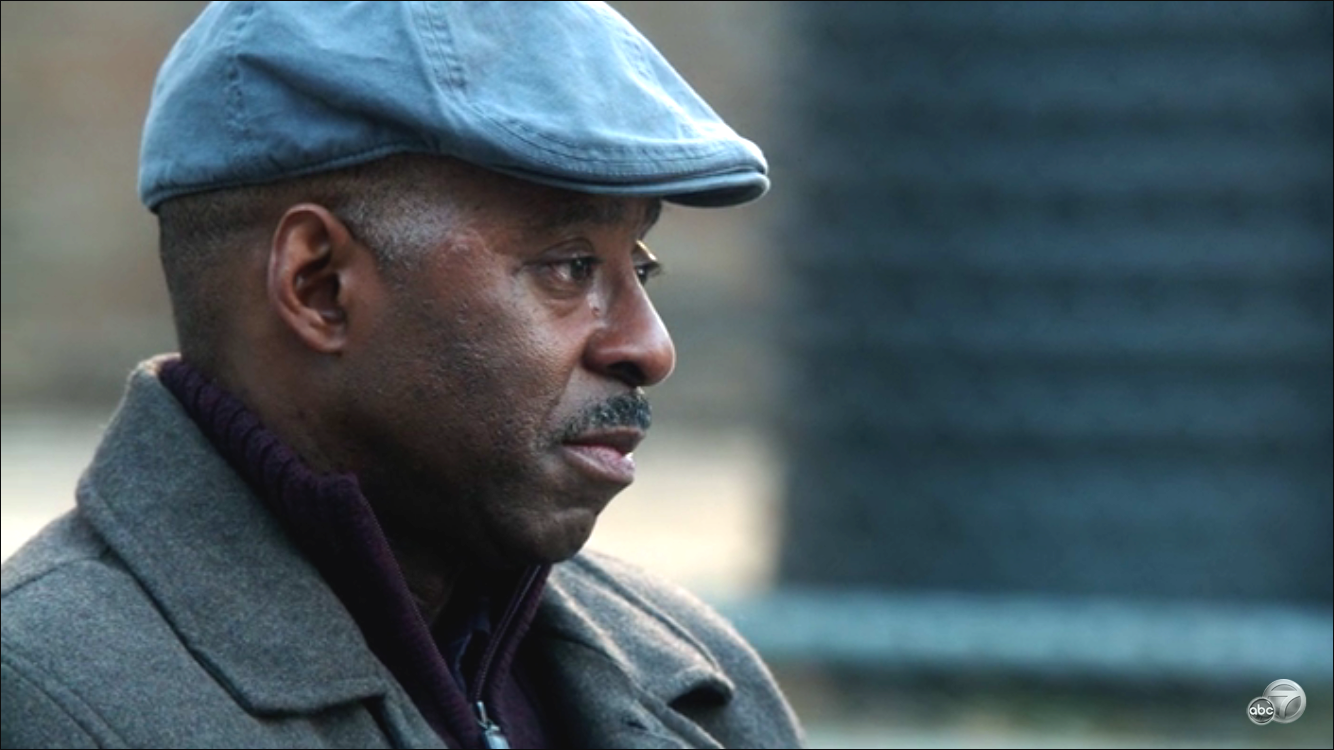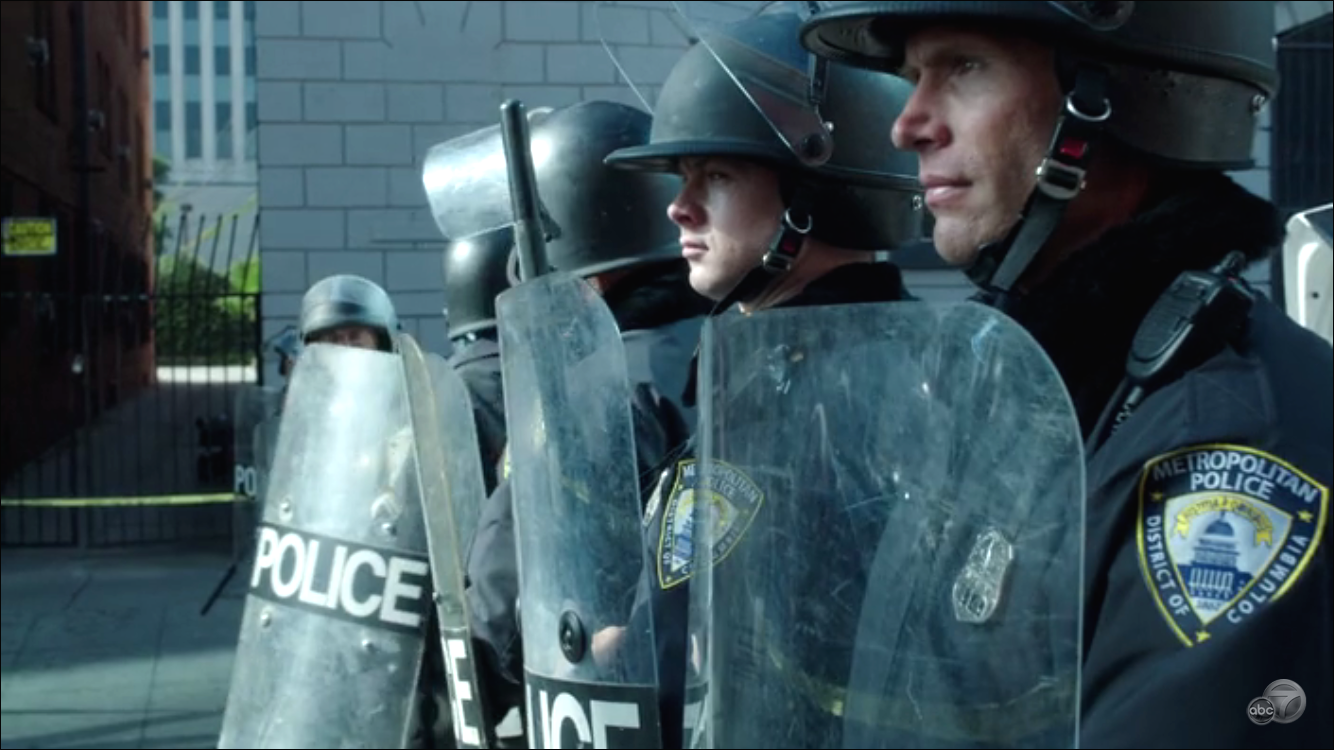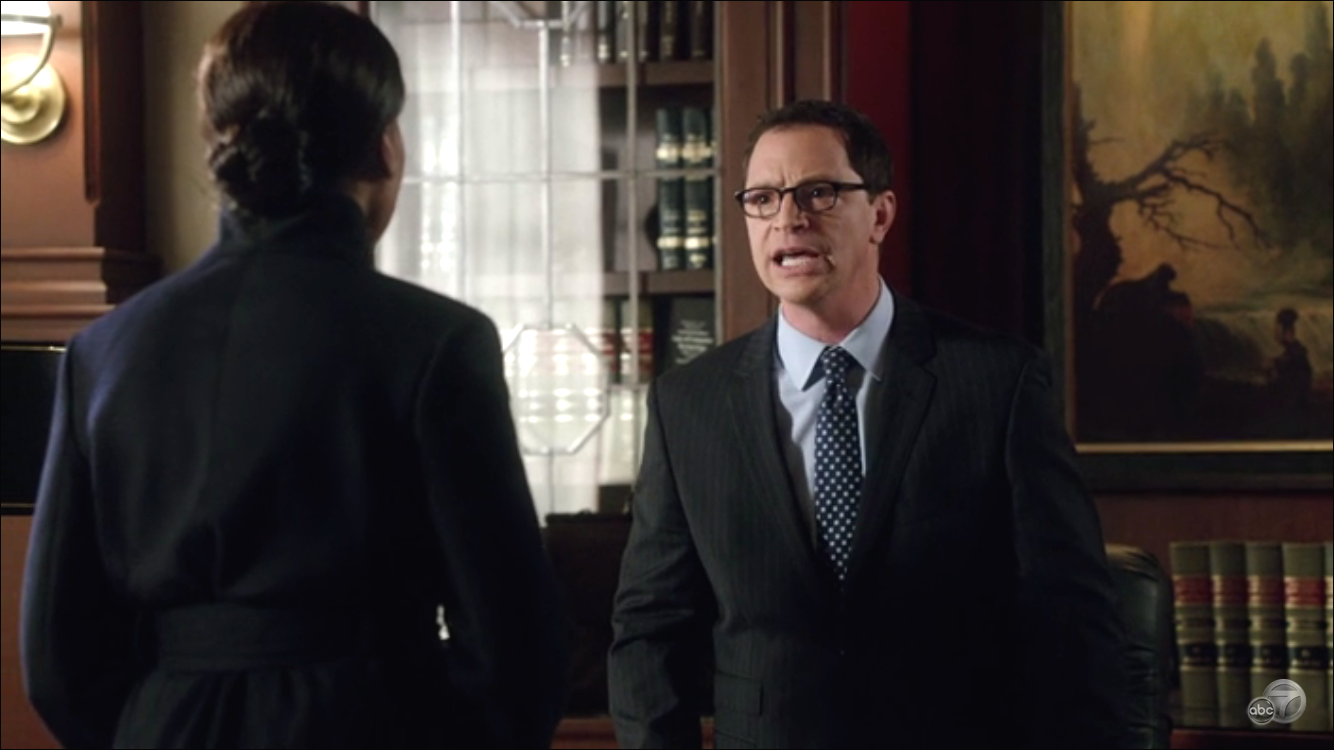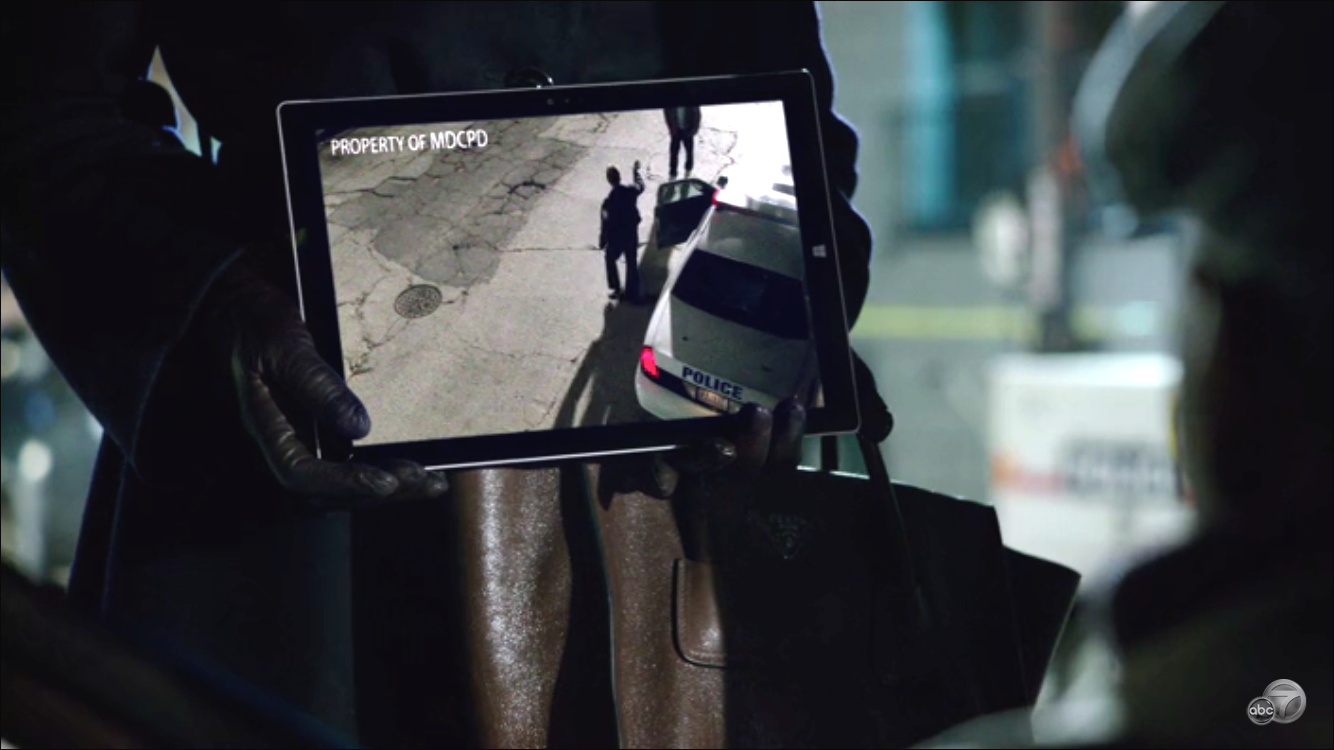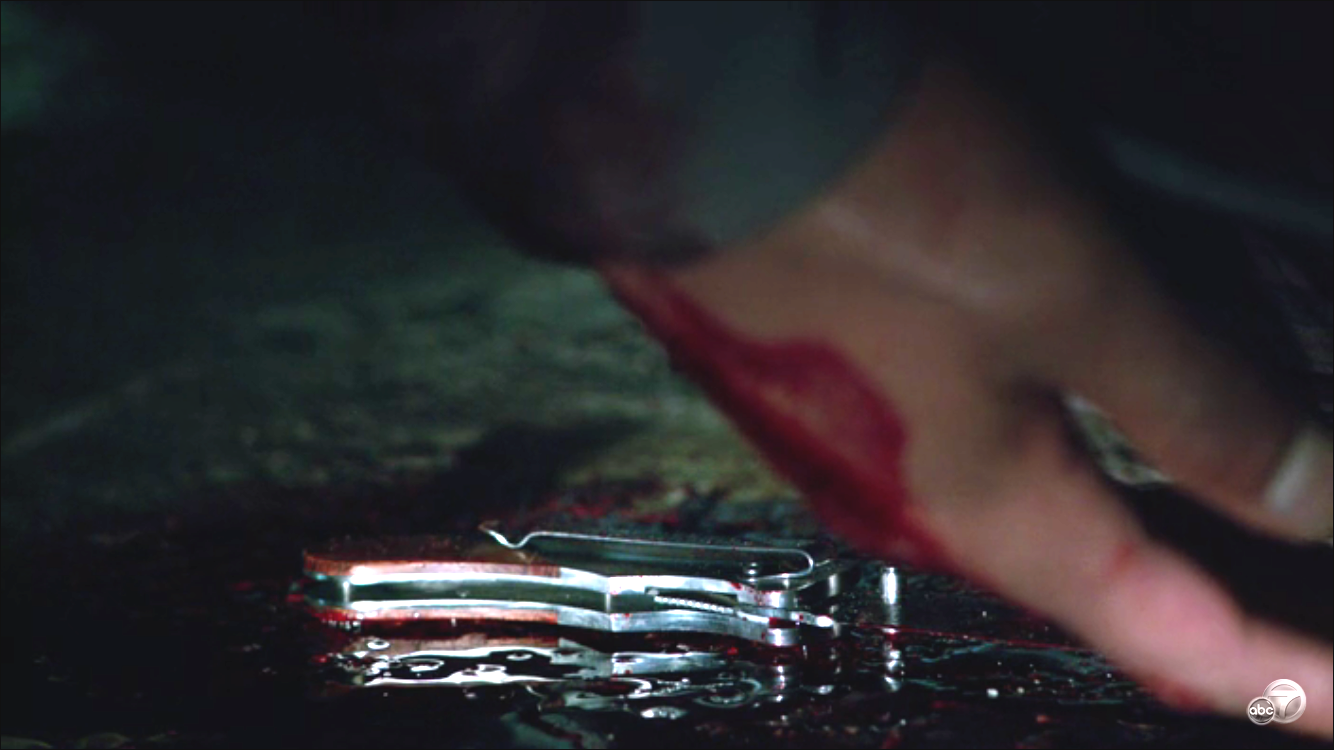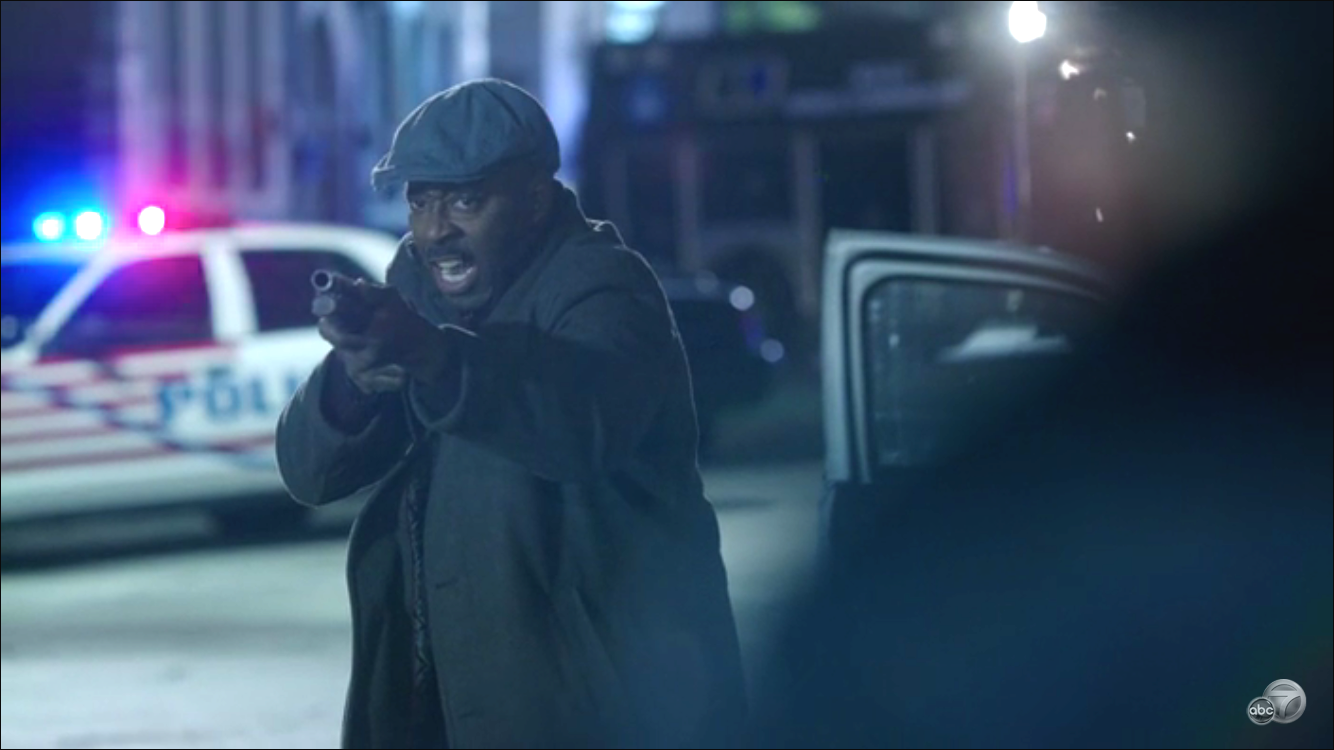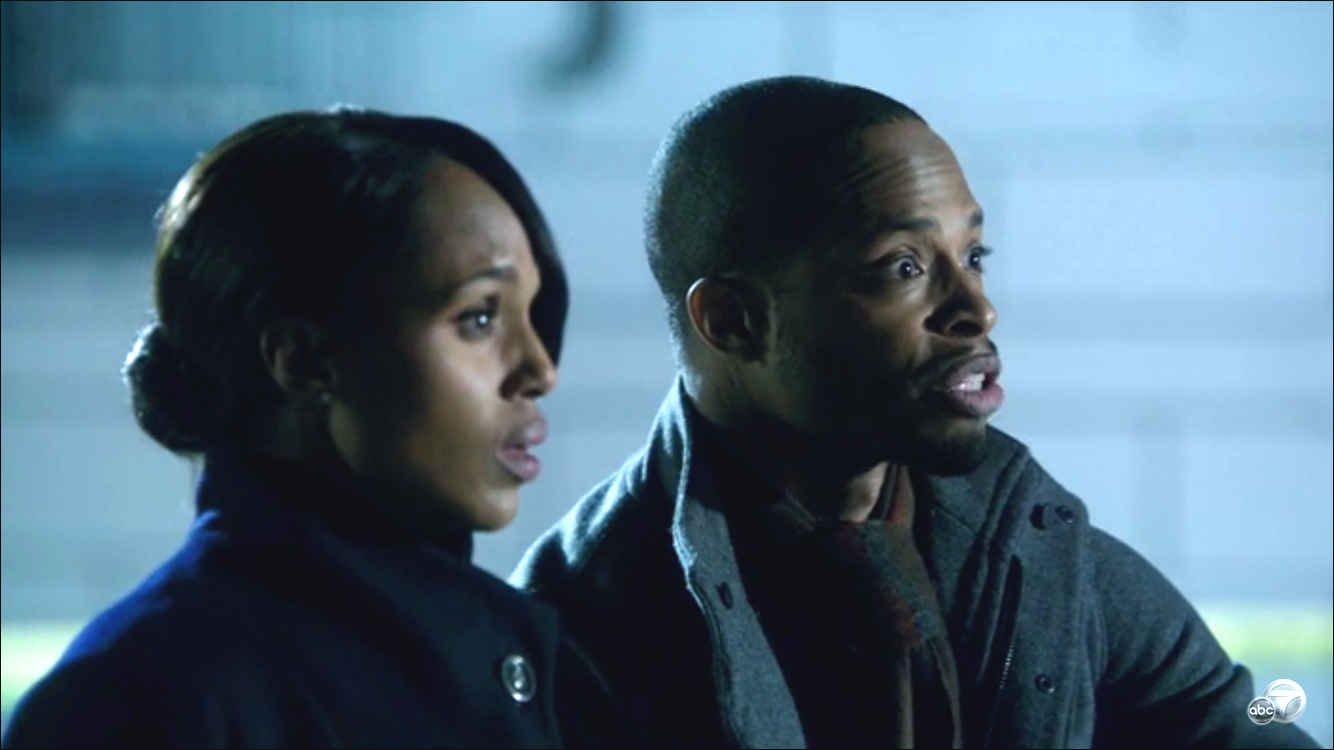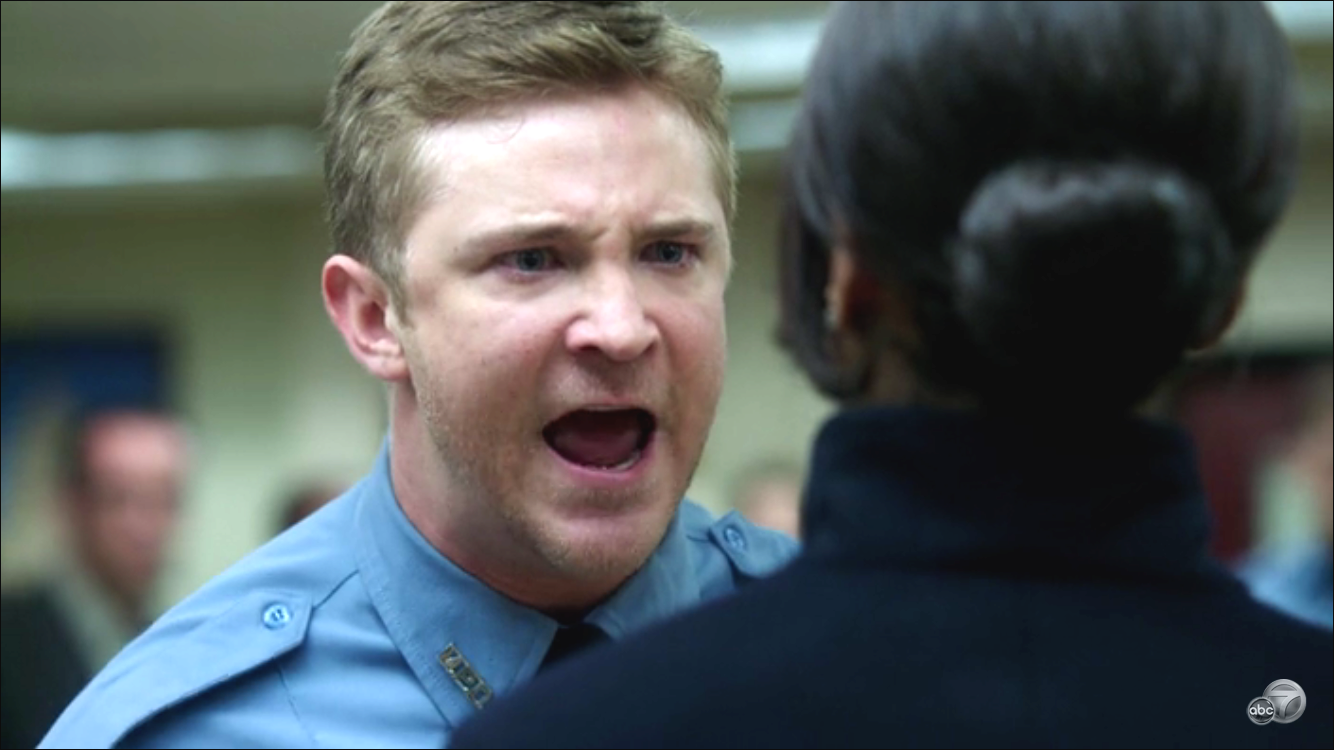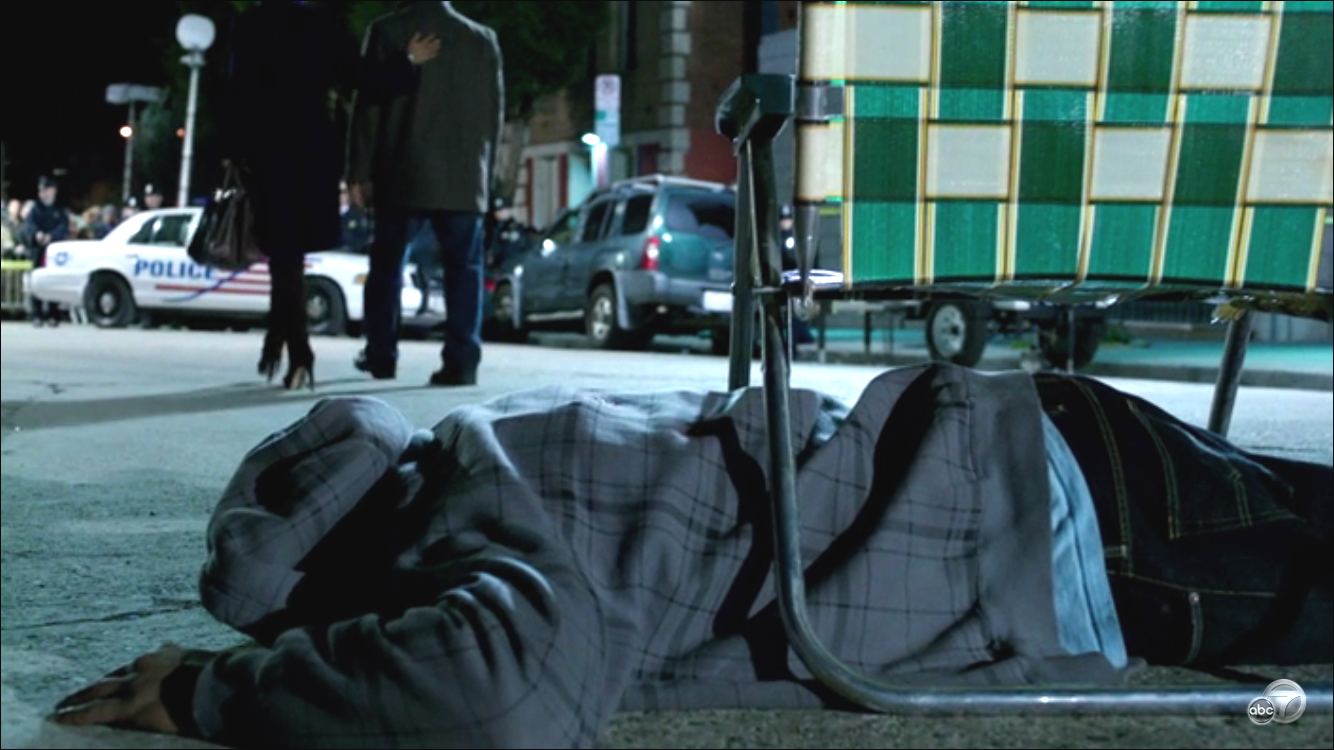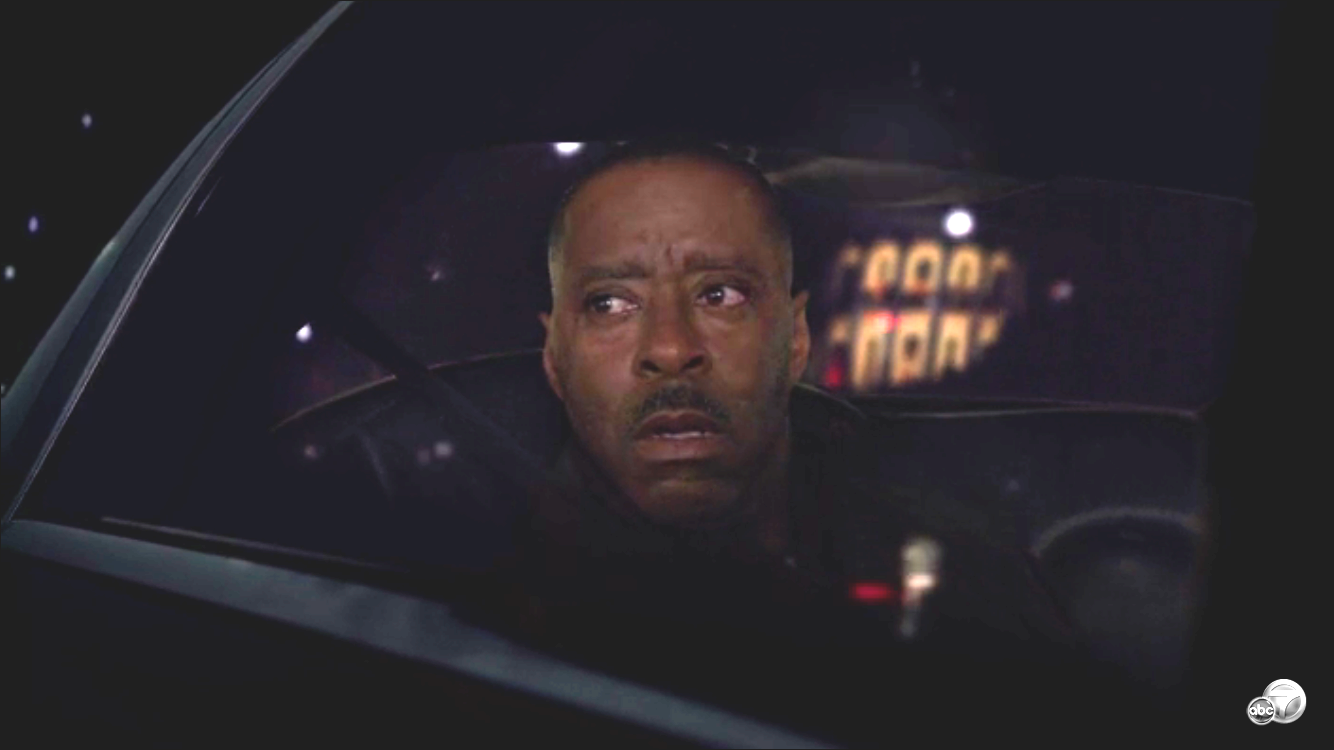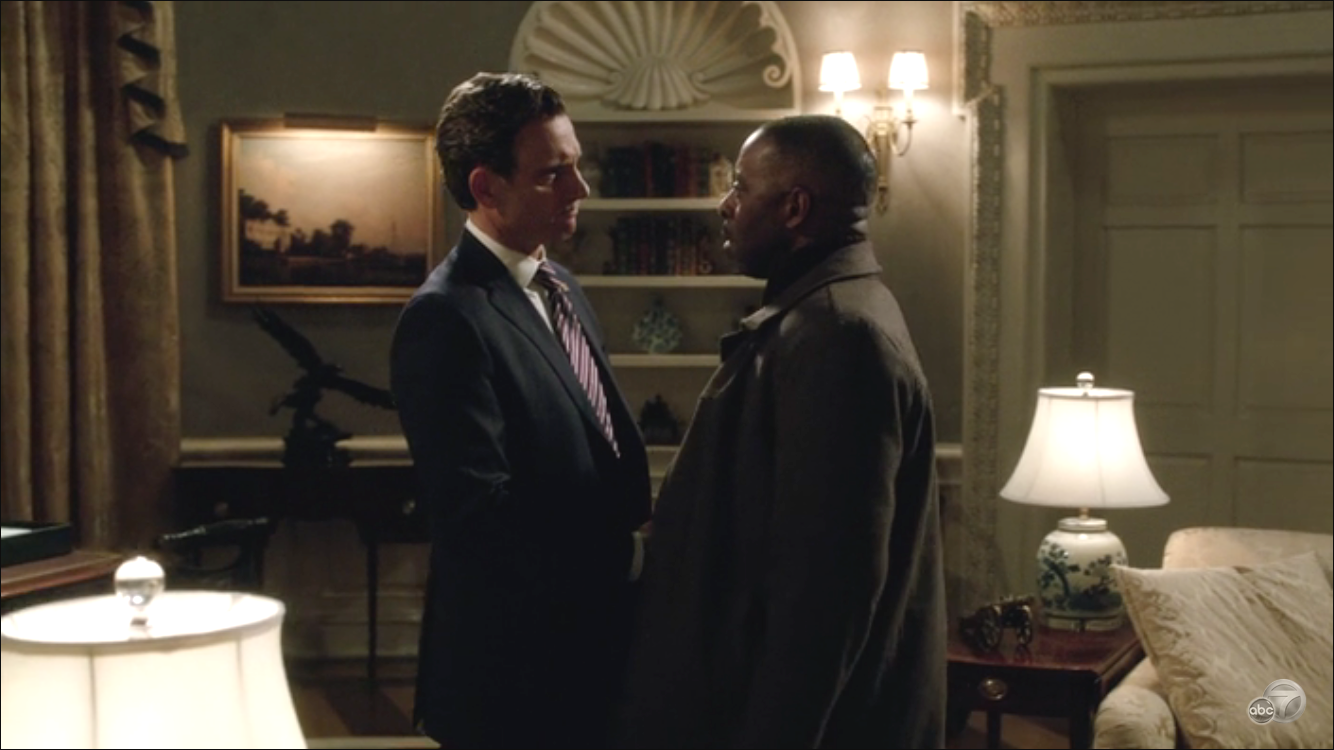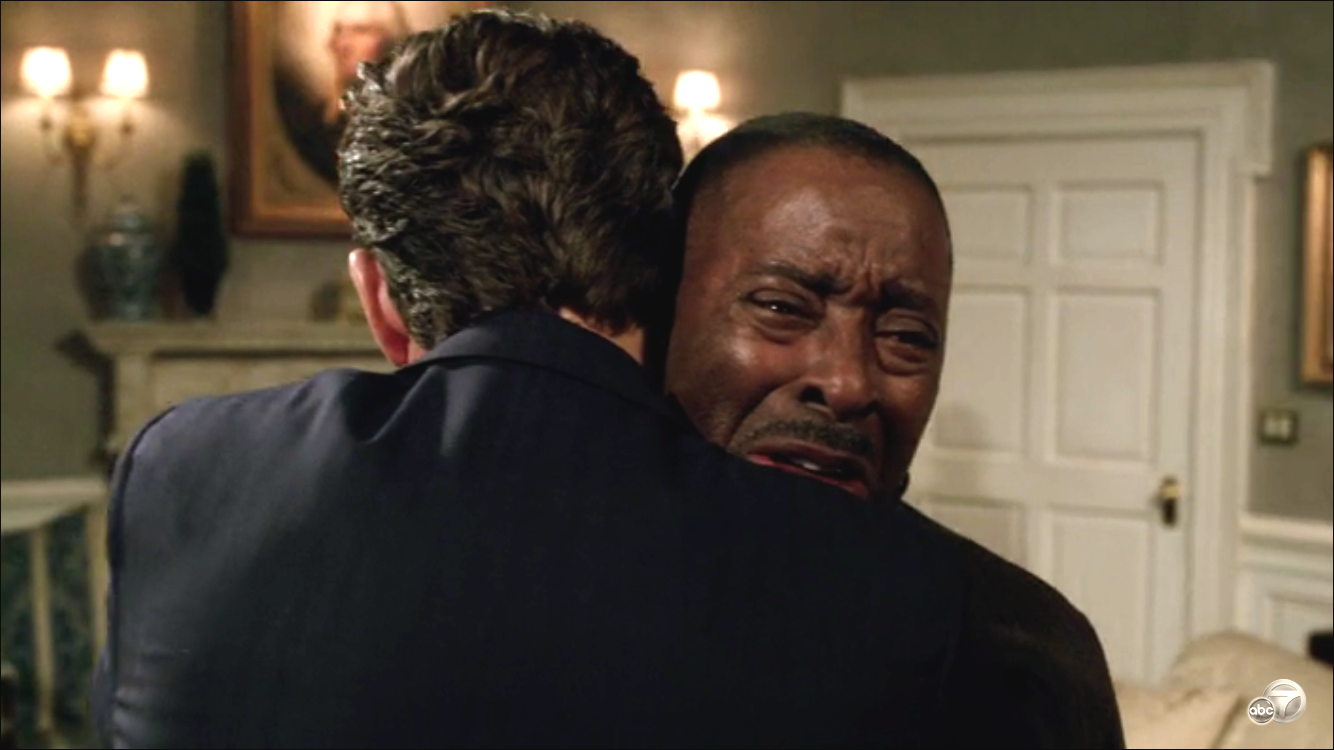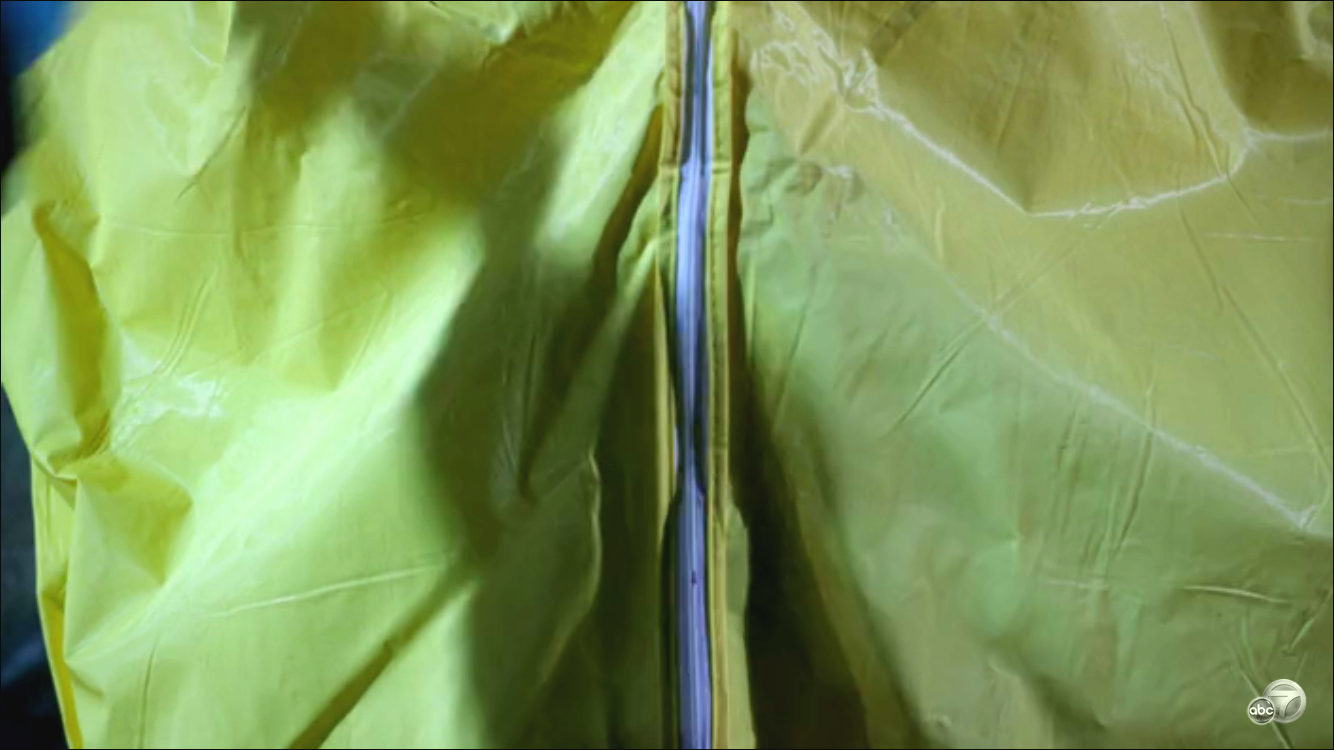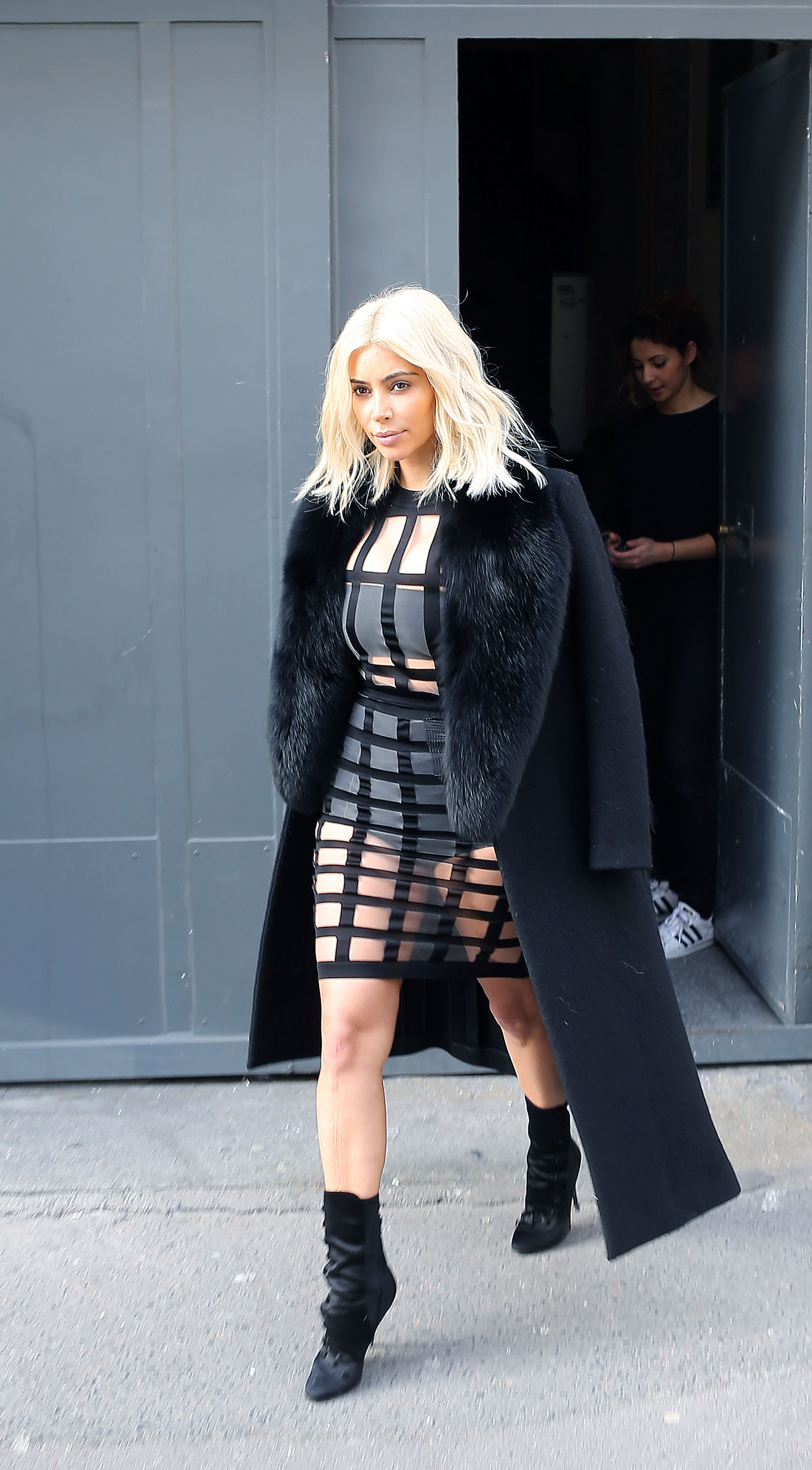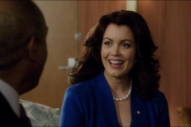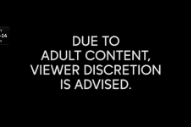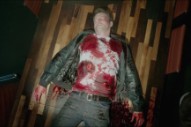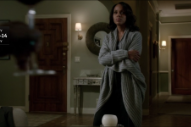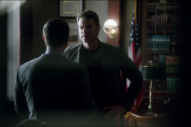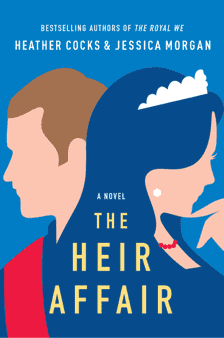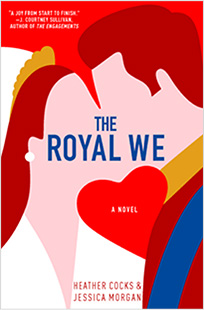This episode, thematically, took on the maelstrom that was Ferguson. For recapping purposes I find it hard to weave in and out of that narrative while making capsy comments about Fitz’s relative worstness and Cyrus’s hair and whether people in the White House are stupid. So, the storylines in this recap are NOT presented in order of importance; instead, I’m getting the B-plot out of the way, so that I can tackle the A plot with (hopefully) the sensitivity it deserves.
So, in the vein of Lady Mary Crawley’s raging death vag (band name alert!), the Veep job has a zero percent success rate. Sally “Crispy Piggy” Langston went insane and then murdered her husband, and Jon Tenney tried to overthrow Fitz (I feel you on that one, Jon), but through blackmail and kidnapping. Then Huck gave him a stroke and he’s probably not going to recover from it, so the next step is to nudge him out of the office on grounds of incapacitation, and pick a successor. The Daily Show in this universe would be having a field day about how little anyone wants to step into those doomed shoes. Fitz, to Cyrus’s astonishment, only wants to vet two ancient and dull and crusty candidates, rather than an up-and-comer who could make it the exciting four years Fitz promised. It’s also worth noting that Jon Tenney was NOBODY’S choice EXCEPT Fitz’s, so at this point his ability to judge a good Veep is on par with Huck’s ability to judge when to stop drilling holes into people.
This lady, a senator from New Mexico, uses the events from later in the episode to record a very heartfelt personal message to the world about tolerance and how all lives matter. She’s a youngish female Republican, and Cyrus thinks she’d be a strong candidate. Fitz tells Cyrus why he doesn’t want that: because he promised Mellie she’d be next, and if he anoints a viable, electable Veep, it’ll be impossible competition. SLOW YOUR ROLL, Remedial Strategists. If you doofuses — doofi? – think that picking a strong VP at this point would erase Mellie’s chance at being president, you are insane, because MELLIE WOULD BE DUMB TO RUN RIGHT AWAY. Let’s take recent history as an example. Hillary Clinton did not run for president at the end of Bill’s tenure. And even if Al Gore hadn’t been an electable VP, I still don’t think she would have run. Because she knew she had to serve in other ways and build up her resume, and that’s just what she did during Bush 2.0’s tenure. And not for nothing, SHE STILL DIDN’T WIN. Ergo, this veep could easily run and even serve two terms while Mellie is solidifying her candidacy. The ENTIRE logic that the veep has to be someone unelectable when Fitz leaves office is asinine. Unless the big plan is to throw the White House to the opposition party and set the stage for Mellie that way, but what a horrible plan. If you are Fitz, and you stand on a certain side of the aisle, then it is the OPPOSITE of good governance to cavalierly decide to throw the next general election to the other side, just on the offchance that your wife gets elected eventually. All of you are THE WORST.
Mellie, at some meet-and-greet, shakes hands with Susan Ross — whom you might remember as the really out-there candidate that Liv got elected when they needed to destroy Abby’s ex-husband’s candidacy. Mellie does an especially poor job feigning interest in poor old Susan, who just wants to natter on about tax code and vaccination schedules (an issue Scandal rightly stops short of addressing in any real way, because let’s NOT take on that and Ferguson in the same hour, guys). Susan comes across as an excitable eager beaver, and Mellie appears to want nothing more than to scrape off Susan’s face with a microplane grater.
Mellie also gets angry when she hears that Fitz is having Cyrus vet Senator New Mexico. “I prostituted myself so you could get your mistress back,” she growls. She can win every argument until the end of time with that one.
HOWEVER: It’s revealed that someone leaked Senator New Mexico’s potential candidacy, and the press dug into it hungrily and uncovered all manner of things that they can’t sweeten on the fly. She is OUT as a candidate. Cyrus is furious, but Fitz tells Mellie that HE is the one who leaked it to tank the woman’s chances, because he is still committed to Team Mellie and this was the only way to make Cyrus take his side. So basically, Fitz first prioritized his lover over the US’s needs, and now has potentially prioritized his wife. Not that Senator New Mexico would have been a perfect choice, but the people HE’S considering are deliberately TERRIBLE choices and that is a conscious decision to jack with the next three or so years. So well done, Fitz. Even in your attempts to be a nice husband, you excel only at one thing: BEING THE WORST.
Mellie then suggests the perfect unelectable VP candidate: Susan Ross. And I JUST CAN’T. The freaking 25th Amendment says that the president’s choice has to be ratified by a majority vote, and does anyone really think that a first-term senator who was elected like half an hour ago will be signed off on so merrily by the houses of government? However, I actually love Susan. Because as soon as the plan is revealed to her, she is like, “WHAT? NO,” and tells Fitz that she has NO DESIRE AT ALL to be a heartbeat away from the presidency because she thinks that sounds like the worst job in the world — well, perhaps second-worst to the perfunctory and nearly meaningless VP gig, to paraphrase her words. (At one point she even sticks her foot in it by talking about the plotline that’s coming, and how she would actually literally kill herself if anything ever happened to her daughter, and realizes AFTER she has blurted all this out that she’s talking to two people whose son died. Fitz’s and Mellie’s reactions are: distressed and fascinated and kind of, in spite of themselves, amused.) Fitz seems delighted by her rash honesty and tells her they need more of it in Washington, and that he doesn’t want a slick politician; he wants someone who’s still charged about doing good in the world. This seems poised to be a classic underestimation of an underdog, and I cannot wait for this to backfire massively on them. I could totally see America coming to love Crazy Susan Ross, and as she becomes trained in the ways she can turn her unbridled candor into a savvy image, I bet she’ll become a nifty foe for Mellie. I hope so, anyway. She brings some lightness to the show, and a rivalry for Mrs. Grant would please me, because she’s at her best when she’s Machiamellie.
All right, now let’s tuck into the meat of the show.
Olivia is called to the scene of a crime in a hardscrabble DC neighborhood in the shadow of the Capitol. The chief of police wants her help, because a young African-American boy has been shot by a cop and is lying dead in the street. The medical examiner is taking an eternity to respond, so Olivia’s role is to help the cop… I don’t know, either spit-shine the situation, or make sure it doesn’t spiral out of control, as the neighborhood’s residents slowly amass along the sidewalk. The boy, Brandon, is stretched out, face down, in a pool of blood.
But right as Olivia gets the download, warning shots ring out, and Brandon’s father Clarence — big weapon in hand — has gone through the police line to protect his son’s body. He doesn’t trust that the crime scene won’t be mishandled, or outright tampered with, and so he refuses to budge. “Bring me the cop who shot my son!” he shouts. A standoff begins.
Marcus Walker, a self-proclaimed “neighborhood activist,” busts through the line — as the cops all draw their weapons — to bring Clarence a deck chair. To help him stand his ground, or I suppose, sit it. Olivia squeaks through and begs Clarence to play by the book: don’t stay, don’t exacerbate, put down the gun and leave and let law enforcement do its job. She even plays the “I can get the Attorney General of the United States” card. Clarence slowly considers the two arguments, and then accepts the deck chair and places it over the body of his son. “In case it rains,” he says plaintively, and then sits down in it with his rifle across his chest like a shield.
Olivia interviews the cop who shot Brandon, played by an actor who was Mike (one of the few memorable high-school classmates) in the Twilight films.
His statement is: Brandon matched the description of a kid who’d shoplifted a cell phone from a nearby store (although Olivia points out the description — vague enough — matches half the kids who live in that area). The cop saw him carrying a brand-new phone and/or box and pulled over to question him, at which time Brandon grew defensive and seemingly agitated, and then reached for a knife in his pocket. Olivia is careful to ask him if he saw the knife; he says he did. Then he says he fired to protect himself, and called for backup. His account is halting, emotional.
I also need to say this, and it’s going to sound mean, but I promise I don’t mean it that way: This guy had the perfect face for the part of a cop who will turn out to be kind of ragey and petulant. Because something about him totally evokes That Doughy-Faced Douchebaby You Knew In College Who Always Tried Too Hard to Act Like A Dude and Never Grew Out Of Using Gay Slurs. And I must clarify that I have NOT found this actor to have That Face in his other roles. He’s actually funny in Twilight, mostly because he — like I am — is not impressed with the Cullens. But something about it all comes together here. And he is extremely good, which I’ll get into later.
Olivia makes good on her promise to call David Rosen, and he comes off like a jerkwad for blowing her off — although it’s not so much that he doesn’t care, but that he says it’s not her legal right to call on him, and that he has to follow the chain of command. And that the AGUSA can’t make house calls. It makes him look like an asshole because we, as a viewer, know where this could go, and know that Oh, Just Another Murder is a toxic attitude. But it’s also true that Olivia was awfully arrogant to snap her fingers and demand his presence, and that it’s a bad precedent to set for David to drop everything and run just because Olivia blows her pope-whistle.
It rather interestingly puts Olivia in the position of privilege, because she makes it clear that she thinks she can fix this with a flick of her hand, by offering up the connections that now come so easily to her. She, too, is anxious to overlook the deeper wounds, in the name of smoothing over the scar. Don’t make a fuss, just let everyone play their role and trust in the powers that be. Which puts her in direct opposition to the people of Ferguson, and this fictional D.C., and everywhere else in America who don’t feel safe applying that same faith. In short, it lands Olivia squarely in the Part of the Problem bracket, which was a smart choice for the show because I think it’s completely in character. She’s a fixer. She wants to solve problems and clean up messes. She is a rich and, yes, privileged woman for whom morality can sometimes be a detriment because it interferes with the work she’s doing.
She is not alone in this, obviously, in life or on Scandal. But Marcus Walker points out that Olivia was called there not so much to clean up the mess as because of her skin color — because the police figure having a black woman on their side to defuse the situation means the frustrated, scared, and furious black residents of the neighborhood will feel like everyone is on the same side. Olivia normally controls the optics, but here, Olivia is the optics. The medium is the message.
But Olivia — as Marcus Walker later adds — carries a Prada bag and has the president on speed-dial. He does not know that she just spent a chunk of time kidnapped, covered in another man’s brains and blood, and on the auction block for billions of dollars — but who among us hasn’t had a ten-figure bounty on his or her head at least once? All Marcus sees is a person who twice got a Republican elected to the White House and is merely playing the role of a “down-ass” African-American woman when in fact she is alien to their situation no matter what color she is. The daring implication being, she is white privilege even if she is not white.
“You’re not getting your black card validated today,” he sneers at her, and it cuts.
This, I think, is what gives Scandal’s spin on this story a special edge. Often these issues are painted strictly in terms of black versus white, when in fact, there are a lot of people caught in limbo in between — be it on race lines, socioeconomic lines, or both. I’m not saying that Olivia doesn’t empathize with the dead kid or his family, or even his neighbors; just that we are all, by nature, the heroes of our own story. And it’s hard to see yourself from the outside, the way a person in a different circumstance might. Having sympathy, or empathy, for another person isn’t the same thing as true understanding. Too often those things are confused.
Let’s pause to compliment Olivia on how unmarred and sleek her bun managed to remain.
Amid this EXTREMELY SUBTLY FRAMED shot, the crowds begin to chant, “Stand up, fight back. No more black men under attack.” The police chief debates bringing in the riot police, and Olivia begs them not to: “The fact that they stand in groups and say things you don’t like does not make them a mob. It makes them Americans.”
Huck, meanwhile, is trying to help. I don’t even remember how. Jake pops in at one point to remind everyone that Olivia shouldn’t be out there because she’s probably suffering from PTSD, but whatever. It’s almost like they forgot they had to pay Scott Foley for this episode and were just shoehorning in some lines for him. Nothing breaks the mood, also, like Grimacing Scott Foley and Captain Huckbeard.
And then in comes Perd Hapley:
“A local man suspected of murdering people with drills and dismembering them was arrested today… are NOT words I will be saying, because that will never happen.”
And here is the strength of the episode: Scandal got Courtney B. Vance to play Clarence, and he is… wonderful, although that does not put a fine enough point on it. There is none of Rowan Pope’s posturing or speechifying or studied monologuing. Everything simply flows from him. You feel his grief from the way he holds his shoulders, from the look in his eyes, from the slow speed at which he moves his head, as if he’s giving in to quicksand. The show gives him a speech, which he delivers to Olivia, about how Brandon was a good boy. And how he could never sleep at night until he heard his son’s key in the door, and kept him away from all the bad stuff — told himself if he could just get Brandon to age 18, then he’d be safe, because he could go off to college and start to leave behind the stigma of being a black kid in a rough area of a tough city. He even, Clarence recalls, put a University of Maryland bumper sticker on their car so that if Brandon got pulled over, a cop might see him as more than just a thug. It’s not necessarily breaking new dramatic ground, textually, but the delivery makes it exceptional. You are just… with him.
Olivia begs him once again to reconsider his protest and save himself while he can, but Clarence says, “You and I both know the only way this ends is with me dead or locked up, because that’s just the way things go around here.” The tear that leaks out of the corner of his eye is subtle, gentle, but immaculate. It’s heartbreaking and the most affecting scene Scandal has eked out in a long, long time. Full marks. Courtney B. Vance ought to get a guest-actor Emmy nomination for this, if not also an easy win.
The Riot Police are closing in, and Olivia realizes that the police chief has effected a massive media ban so that all anyone on the news sees is more news about the vice-president’s stroke. She finds it appalling that he is using the press to shield the actions of his forces — effectively letting them intimidate the crowd while the world is looking the other way. The chief insists he’s just trying to keep things from becoming a total circus. I understand her point of view — it’s hard to tell which comes first, the chicken or the egg. Does the crowd get riled up because it sees the riot police lying in wait for a fight, or do the riot police come because the crowd is riled up? But Scandal does a fairly even-handed job here of saying, yes, okay, we are rooting for justice and for Clarence, but here is the other side: What are the cops supposed to do now? Can you trust that the crowd’s emotions won’t boil over into something more violent? How does someone like the chief here, well-intentioned, and not (seemingly) part of the problem, avoid becoming part of the problem in the course of doing his or her larger duty? Etc. Of course, the benefit Scandal has in being fictional is that it can script a fairly nice chief of police who doesn’t want to cover up wrongdoing, and isn’t sure how to do his job to minimize the casualties. He is TRYING to look out for all sides. In real life we are rarely so fortunate.
Anyway, Olivia is so mistrustful at this point — and so certain she’s been brought there for political reasons rather than for him to listen to her actual advice — that she joins the chanters on the other side of the barrier.
Olivia then goes to David one more time to yell at him — first for sending an ADA instead of his own damn self, and second, for not helping. He tells her that she’s just agitated from PTSD and needs to relax. Olivia sinks into a chair and tells him that she spent a week of her life thinking she was dead. Knowing it. Waiting for it. And that it was agonizing. “Imagine feeling that way every single day,” she says, soulfully.
Cut to: David finds surveillance footage of the killing. It shows Brandon reaching inside his coat before he is shot and killed. “My son didn’t carry a knife,” Clarence says, flatly. Olivia convinces him to let them roll the body and check.
And, in a pool of blood, there one lies.
“MY SON DIDN’T CARRY A KNIFE,” an enraged Clarence insists, as he re-shoulders his weapon and points it directly at Olivia, at Marcus, at everyone.
These two frantically try to calm him down, and Clarence does take his seat again, this time with a more broken scowl. As Olivia walks away from the scene, her hand is shaking uncontrollably.
Then Cap’n Huckbeard finds her with the S.S. Proofmobile: He and Quinn studied the surveillance footage, and he can see that the cop’s car actually had a person in it. Specifically, he picked up a perp at another location who was never booked and processed, but clearly present in the car based on the shadows his body was casting. And that perp was, you guessed it, carrying a knife.
Olivia confronts the cop about letting the other perp go in exchange for his knife and his silence, and Officer Dillweed blows his stack.
He pulls a “you people” with Olivia when discussing African-Americans. He talks about how they don’t respect the law. He says he’s walked the beat for seven or eight years and seen how they ignore him, mistrust him, push his buttons, antagonize him at every turn. He screams that this is about respect, and about there being a place for authority in the world, and that it’s not his fault none of “you people” care about that. It’s an ugly speech. And Mike from Twilight delivers it with admirable gusto. It has to have been SO HARD to commit to that. I feel like I would be handing out written apologies between every take. But he attacks it, and again, not with that irritatingly mannered Scandal meter, but just… naturally, in a way that I respect because of how thankless a task it was.
And so Olivia has to go tell Clarence that they got their man — and that his son was reaching for a receipt, to prove he’d paid for the cell phone he was holding. At this point, Clarence is in so much emotional shock that he can’t even get upset; instead he smiles, relieved that his son was and is everything Clarence believed him to be. Then he lovingly pats his son’s back, as if to say goodbye, and stands up and holds out his wrists to be cuffed. Olivia gently tells him that no charges are being filed, and escorts him to her waiting car.
One nit to pick: Clarence set down his rifle with his son’s body, and then just… left. And no one was around to pick up said rifle. It seems like a bad idea to lay down your loaded arms in the middle of the street ANYWHERE, much less next to the body of a shooting victim. (When they show the coroner arriving on the scene later, it’s from above, and no rifle.) There’s a cop car RIGHT THERE. Couldn’t they have had him turn over the gun to the police as he walked past? I don’t know why this bothered me. But the rifle was such an important prop for the rest of the episode, and then it was like everyone thought, “What do we do with this? Eh, just… leave it.”
Scandal LOVES these shots. And yes, Olivia is — to Clarence’s amazement — taking him to the White House.
Fitz greets Clarence with a firm handshake and kind words. It’s only when looking in Fitz’s eyes that the shock fades, and the sense of vindication erodes, leaving Clarence with only the loss. And he crumples.
And I cried. Generally speaking I don’t cry that much at TV or movies or books. But this one got me. Courtney B. Vance was that awesome. He milked emotion from a stone.
And we finish the episode with a shot of Brandon being zipped into his bodybag. Shonda Rhimes said they debated the ending at length. I think they picked a good one. Because the episode itself tied things into such a nifty bow at the end, that the final image serves as an indelible reminder that the sadness pervades.
The Good Wife tackled Ferguson as well, in January. But the episode felt hasty and ill-thought-out. “Ferguson is too fresh to be a framing device,” I wrote at the time, and in The Good Wife that’s all it was: a means to depict two white characters’ political careers, on a show with a minimally diverse cast that actually hired Taye Diggs earlier in the season and then didn’t use him during an episode where he might’ve added some needed perspective. The beauty of Scandal is that its central character straddles both sides of the line. She’s an African-American woman, but she’s of robust means. She knows the struggle, but she learns is not of the struggle as much as she might have believed, and that’s what the episode shows her. Olivia isn’t USING this pseudo-Ferguson for her own gain. The plot simply serves her growth while also making its own statement, and the episode smartly largely scuttled the tangential people who couldn’t really add to it. (Abby only appears briefly; ditto Jake, and even Huck and Quinn. Fitz’s non-involvement was handled by Cyrus telling him not to speak, because anything he said would be perceived as anti-law-enforcement.)
By and large, I did think it addressed the complexities of the issue even without things escalating to full Ferguson levels. And while my rooting interest was firmly in Camp Clarence and Camp Brandon, Scandal didn’t shy away from at least presenting all sides to at least some degree. Do I wish perhaps it hadn’t been so neat and tidy at the end, with victim and culprit in their precise boxes? Maybe. I’m not sure. We live in a culture of deeply ingrained mutual mistrust between the citizenry and the law enforcement officials who ostensibly protect them; in that situation, even when intentions are pure, it will end badly. And when it comes to dissecting that, maybe something less cut-and-dried would have been just as valuable. Do I wish it had therefore been developed into a larger story arc that wasn’t contained in one episode? I suppose maybe it will be, but assuming this is it, I might be okay with that. Because the hour as it stands does not feel like gimmickry, the way The Good Wife’s did, and prolonging it risks turning it into just another political tool in service of Fitz Who Is The Worst. Which might have lessened its impact.
The timing, too, is nice, coming at a moment when we need to be reminded that the conversation hasn’t simply ended because we are between high-profile crimes. Racism today is often a subtler thing than in our parents’ and grandparents’ eras. Now, it’s about someone walking in the room, or down the street, and never receiving the benefit of the doubt. It’s about perception and presumption. It’s about a hundred other tiny crimes of the mind that can spill over into bigger injustices. And that’s why I think the depth of its pervasiveness been hard for some people to accept. It seems so unfathomable that anyone today could cleave to such an archaic bias, yet every day, society keeps telling us that it’s not only fathomable but actual. So as much as it’s a bold task for a TV show to take all that on in just one hour, if it reaches even one person who wasn’t hearing it before, then the attempt has achieved something.


